They'll wear them for loved ones who they've lost and for family still fighting tough battles; they'll wear them for strangers whose stories moved them to act; they'll wear them for causes near and dear to their hearts.
On Sunday, Seahawks players and players around the NFL will wear customized cleats as part of the league's 'My Cause, My Cleats' initiative. Mike Davis will support his father who is battling prostate cancer, while Frank Clark will honor his grandmother Valerie who died of bladder cancer. Tre Flowers wants to raise awareness for Alzheimer's and dementia, which have affected both of his grandparents, while Bradley McDougald chose Make-A-Wish because that organization granted a wish to his brother when he was battling cancer as a child. Rashaad Penny chose autism awareness because he wants to show support for his autistic cousin, while Rasheem Green is representing SKIP (Save Kids of Incarcerated Parents) because he grew up for the first 12 years of his life with his father in prison.
"They do have the serious causes that they're fighting for and all that," Seahawks coach Pete Carroll said. "It's a good opportunity to make a statement that's followed up—it's not just the game, it's kind of the involvement with the groups and things that they are supporting. It's really good."
Thirty-six players, Seahawks president Chuck Arnold, general manager John Schneider and Legend Walter Jones will wear customized shoes when the Seahawks host the 49ers this week, and all of them have a story behind their cause. These are three of those stories:

Tedric Thompson, Youth Justice Coalition
Love is commuting 90-plus minutes each way, only to spend the work day driving a bus for eight hours, all to make sure your kids are safe and can go to good schools.
For the better part of a decade, Flossie Bradford made that brutal commute down Interstate 405 in Southern California, driving from homes in Palmdale and later Santa Clarita and to her job as a bus driver in Culver City, doing so to make sure her sons Cedric and Tedric Thompson and daughter Cedrinae Thompson would have the safest upbringing they could.
For the first 12 years of his life, Tedric Thompson, now the starting free safety for the Seahawks, lived in Inglewood, Compton and Gardena and other Los Angeles neighborhoods where he saw friends fall in with gangs, where one cousin was killed at the age of 16, and where another, who Thompson says is like a big brother to him, ended up in prison on a long sentence related to gang violence.
Flossie Bradford knew her two sons and daughter were good kids, but she also knew that as her boys approached their teenage years, a move away from that gang violence was necessary.
"That's why I moved from Inglewood to Palmdale, to go somewhere where there wasn't the gang violence like we have out here," said Bradford, who has since moved back to L.A. with her daughter. "… When you have boys living here, you have to really protect them."
Thompson knows his mom sacrificed a lot for her three kids and says that brutal commute "is not even the half the story. She's my everything." But he also would like to someday see a world where moms in certain parts of Los Angeles didn't have to make choices like the one Bradford made for her kids' safety. That's why when players wear custom cleats on Sunday for the NFL's 'My Cause, My Cleats' initiative, Thompson's shoes will be supporting the Youth Justice Coalition, a Los Angeles-based organization "working to build a youth, family and formerly and currently incarcerated people's movement to challenge America's addiction to incarceration and race, gender and class discrimination in Los Angeles County's, California's and the nation's juvenile and criminal justice systems."
On one of Thompson's cleats is a prison, while the other has a school with a pipe connecting the two to symbolize the "school-to-prison pipeline," which is described by the ACLU as the "disturbing trend wherein children are funneled out of public schools and into the juvenile and criminal justice systems" due to zero-tolerance policies that criminalize minor infractions of school rules and the presence of police in schools that lead to students being criminalized for behavior that should be handled within the schools.
"I'm from Los Angeles, so I grew up around a lot of gangs," Thompson said. "A lot of my friends are in gangs right now, so my cleats, one will be red, one will be blue to symbolize Bloods and Crips, then there's a peace sign between both of them to try to put awareness towards gang violence and try to stop it. I'm also talking about prison reform—there's a lot of stuff that goes on inside of prisons we don't really know about. Every time you hear about a prisoner, you automatically think it's a bad person, but that's not the case. So I'm talking about how to improve the living conditions in prison, and about harsh sentencing for non-violent offenders. Also, gang culture, it starts young, so on the other side (of the shoe) there's going to be a school to symbolize that you need to be teaching kids in school what they need for adulthood, stuff like taxes that they don't really teach you about. Being in the inner city, when you get to adult life you kind of get sidetracked by it."
Thompson credits his mom and a "solid background" with keeping him on the right path both before he and his family left L.A. and when he lived there for the first 12 years of his life.
"My mom was always there, she always kept me in some type of after-school program so I wouldn't be around that type of environment, and a lot of my friends didn't have that," Thompson said. "I had my mom, and I fortunately had my dad for a little bit of time while I was growing up. Even my cousins and homeboys who were in the gangs, I was the one, when I was with them, they wasn't really on it because they knew I was in the car. If something was about to happen, they'd steer me the other way. Or if I thought about joining a gang, they were always in my corner like, 'No, you've got something else to do. You can't focus on this, go focus on that.' So I think I just had a strong background."
Thompson managed to stay out of trouble, but he was all too aware of how real the danger around him was as a kid.
"One of my cousins died when he was 16, I was young, I think I was 12," Thompson said. "He died to gang violence. I've got a cousin now who's like an older brother to me who has been in prison going on seven years now. He's a big reason why I'm doing this, he's a big motivation in my life. He's really like an older brother to me, like a father figure. I've also got another cousin who is in a gang, and he's about to face five years due to gang violence.
"And these aren't bad people we're talking about, it's people who got caught up in bad situations because they didn't have the resources, so they had to figure out how to make something out of nothing. Some stuff is really hard to get out of because you're around that culture. When kids grow up and all they know is Compton, or all they know is Inglewood, it's bred in them so they don't see a way out of that."
Thompson is a starting safety in the NFL because of his athletic ability, but also because he had a mother and a support system that kept him from the same gang violence that led to the death or incarceration of so many others around him, so now he feels like it's his turn to provide some of the same support to kids in Los Angeles.
"I'm very proud of him," Bradford said. "Tedric's trying to make a difference for his family, but also for kids down here. He's trying to help kids to understand not to go down the wrong path. He's trying to get kids on the right path, that's why I'm so proud of them."

Sebastian Janikowski, Crohn's & Colitis Foundation
Sebastian Janikowski's job comes with a lot of stress. In the world of NFL kickers, a bad couple of weeks or even a really bad game can cost a player his job, so every missed kick has the potential to eat at a kicker long after a game has ended.
But if Janikowski ever lets an off day get to him, he quickly remembers that his wife, Lori, deals with bigger problems on a daily basis and reminds himself that there are worse things in life than a missed field goal or extra point. When Sebastian and Lori were dating more than a decade ago, she started getting sick and didn't know why. It took about a year for Lori to finally get a diagnosis of Crohn's disease, a chronic inflammatory condition of the gastrointestinal tract.
"It was tough for her, she couldn't eat," Janikowski said. "We went through a lot. It's so tough. It's like, if I had a bad game kicking, I feel bad, but what she's going through is 100 times worse."
Fortunately for Lori, regular treatment with a drug called Remicade has helped keep her symptoms manageable, but she knows a lot of people have it worse than she does, which is why this year she and Sebastian decided to support the Crohn's & Colitis Foundation on Janikowski's cleats Sunday when Seahawks players take part in the league's 'My Cause, My Cleats' initiative.
"When Sebastian got this opportunity, I was like, 'Let's do it on this,' because so many people don't want to talk about it, and so many people don't know anything about it," Lori said. "A lot of times I'll talk to a person and tell them I have Crohn's disease, and they're like, 'Crohn's disease, what's that?' So just the awareness is great."
Awareness is particularly important with Crohn's because the symptoms, ranging from diarrhea to blood in the stool to severe abdominal pain and cramping can be uncomfortable or embarrassing to talk about. Making people more aware of Crohn's disease makes it less difficult to live with, particularly for children battling the disease.
"This is important to me and to her for people to understand more about Crohn's," Sebastian said. "Because a lot of people keep it to themselves, they don't talk about it because they're embarrassed to talk about it, they don't want people to know. I think it's a great cause, and that's why we're supporting it."

Quinton Jefferson, Jordan McNair Foundation & Gun Violence Prevention
Quinton Jefferson never met Jordan McNair, the two missing each other at the University of Maryland by a year. But when McNair, an offensive lineman preparing for his sophomore year, died in June due to complications of heatstroke, it still felt personal for Jefferson.
"He's a Terp, so that's family," the Seahawks' defensive tackle said.
On Sunday, Jefferson will honor McNair with a custom-made shoe as players around the league take part in the NFL's 'My Cause, My Cleats' campaign. Jordan's right shoe features the Maryland flag, as well as the letters JMF, short for Jordan McNair Foundation, a non-profit started by McNair's family following his death.
Jefferson's other cause is gun violence prevention, and his left shoe has the initials of people he knows in his hometown of Pittsburgh who have been affected by gun violence.
"We're extremely proud and grateful that a fellow Maryland Terp would step up and honor Jordan's name like that," Martin McNair, Jordan's father, said in a phone interview. "That's extremely monumental to us and respectful to the work that we're doing."
It has been a tough year for the McNair family, but finding out that an NFL player who did not know Jordan plans to do something so public to honor him provided a positive note during a trying time.
"It's been tough," Martin McNair said. "This first Thanksgiving without Jordan, it was an extremely somber week. We know we have more of those ahead of us, but he's way more known now than he would have been on somebody's offensive line, so we want to use that to save some lives in his honor.
"What we do at the Jordan McNair foundation, our main goal is to bring awareness, education and prevention to exertional heat stroke. That's our primary concern, because it's a 100 percent preventable injury that happens so much. This is not the first time that this has happened, it's like the 30th time this has happened. However with the national recognition his story has gained, we want to take this opportunity to prevent this from happening to someone else's child."
In addition to honoring McNair and raising awareness for the Jordan McNair Foundation, Jefferson is also remembering people from his hometown who have fallen victim to this country's gun violence epidemic.
"My second cause is about gun violence, especially in the African American community," Jefferson said. "I'm going to have a list of all the people I know personally who have been killed by gun violence. It's just eye-opening, because it's like 30 people on there, people I personally know who have been killed. It's eye-opening, so I just want to bring awareness, this has to stop."
Jefferson considers himself fortunate to have steered clear of the problems that affected so many people in his life, and wants to use his platform as an NFL player to honor those who weren't as lucky, and to try to help change things for future generations.
"I was blessed to have my mother and my father in my life, they kept me out of trouble, made sure I was always involved in sports and just kept me on the right path," Jefferson said. "I was blessed to be surrounded by good people, like my grandfather, who was one of the biggest influences in my life. He made sure my head was on straight. He'd give me gems, words of wisdom, always talking to me and making sure my head was right. I was just blessed to have a good foundation."
Jefferson calls the gun violence that plagues his hometown, and America in general, "Very frustrating. I just don't know how you can take another person's life and not value another person's life. I just can't fathom it. Something needs to be done. There needs to be stricter gun laws; it shouldn't be that easy to get a weapon. It's crazy."
Being a parent of four young children makes Jefferson even more passionate about this cause.
"You kind of feel like you're not safe anywhere, not at school, not at the movies, not at your house," Jefferson said. "You want your kids to come into a better world, but as a parent you're scared. I shouldn't have to worry about, 'If I let my kids go to school, will they come back to me?' But that's the world we live in right now. So I'm just trying to bring more awareness so maybe people will see it."
Seattle players will wear customized cleats designed by local artists during Week 13 of the 2018 NFL season recognizing causes that are personal to each player. Check out the Seahawks' kicks and learn more about the causes they have chosen to represent.
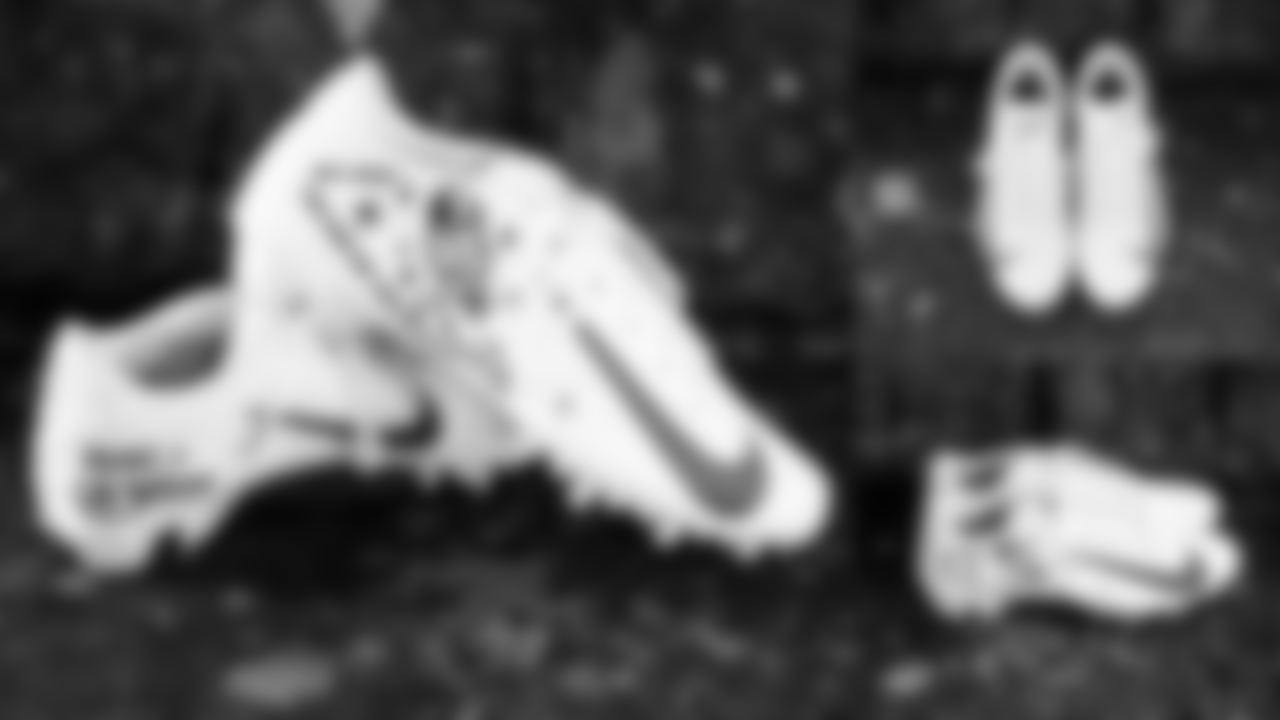
WR Jaron Brown
Cause: Make-A-Wish
Brown: "While it may be popular, I chose Make-A-Wish because I feel like it's very important what they are doing for the kids. The theme I chose was like 'Dreamers', which is just to show the kids that the sky is the limit."
Artist: A.CODD
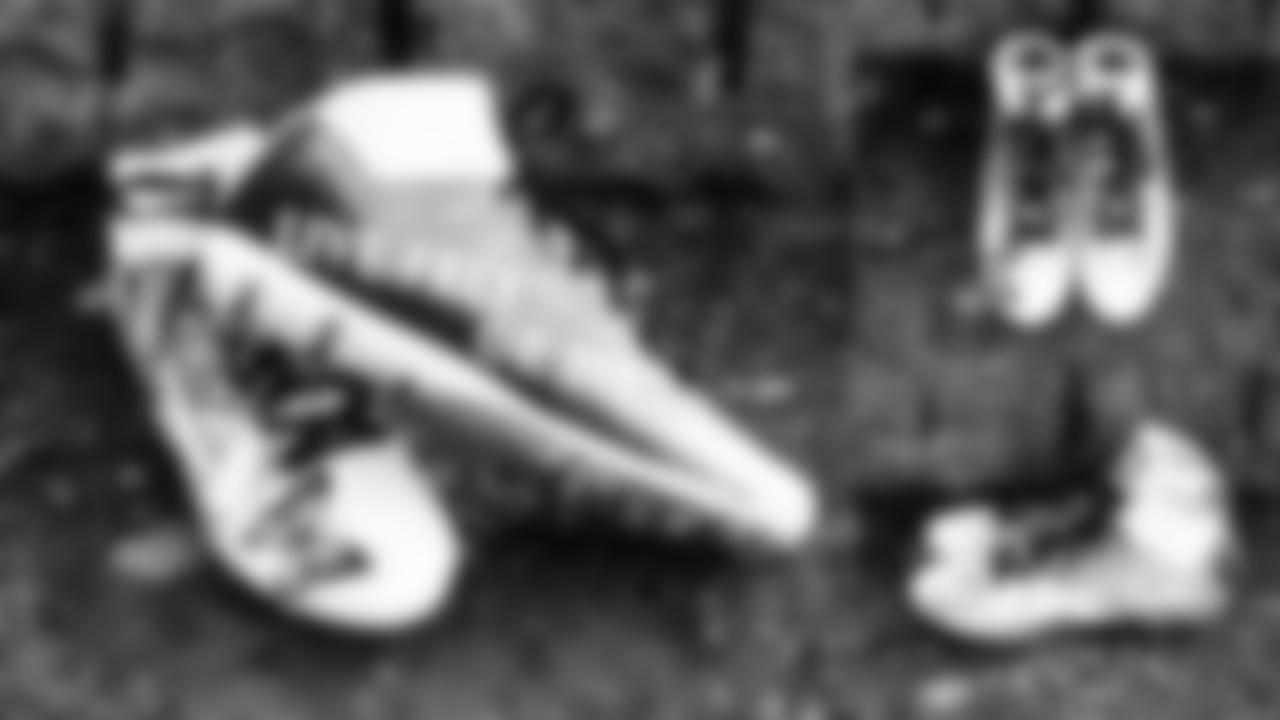
LB Austin Calitro
Cause: Breast Cancer Awareness & Mental Illness Awareness
Calitro: "My sister has a mental illness and my grandmother has breast cancer so I thought this game would be good to dedicate to them."
Artist: CusTheArtist
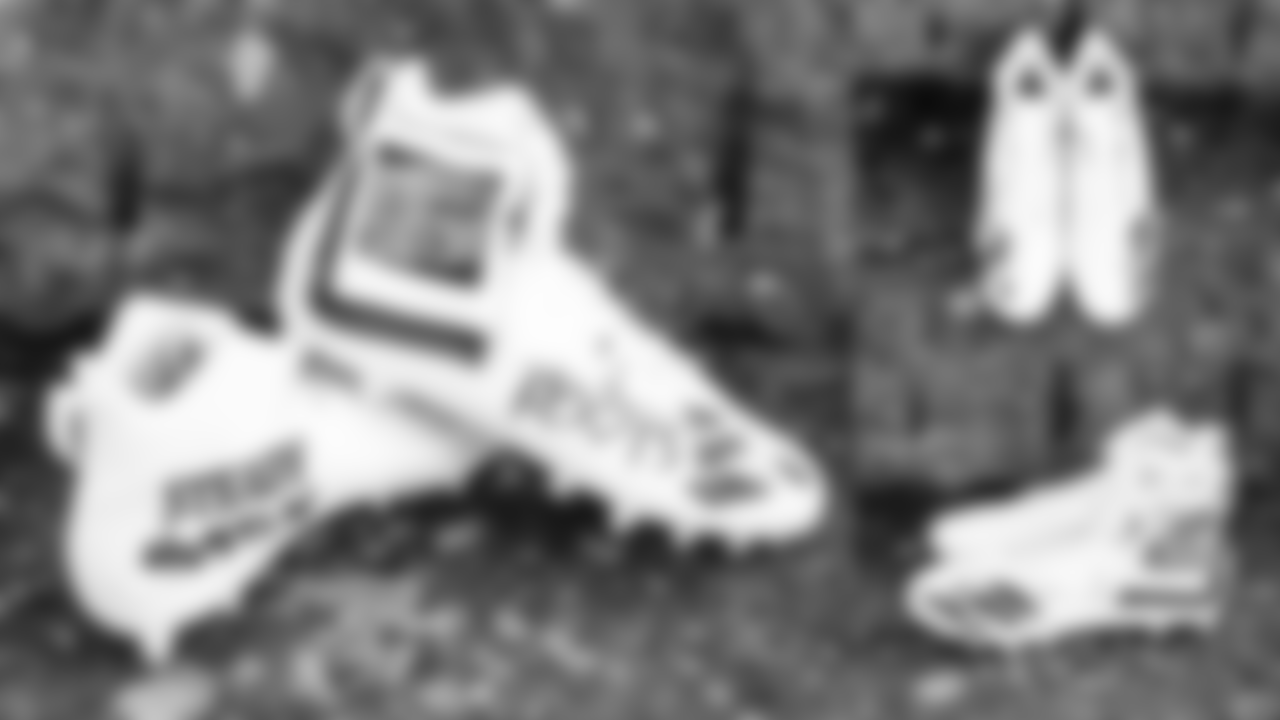
RB Chris Carson
Cause: Homelessness, ROOTS Young Adult Shelter
Carson: "I wanted to support ending homelessness, so I felt like that would be a good way to bring it out, by using my cleats."
Artist: CusTheArtist
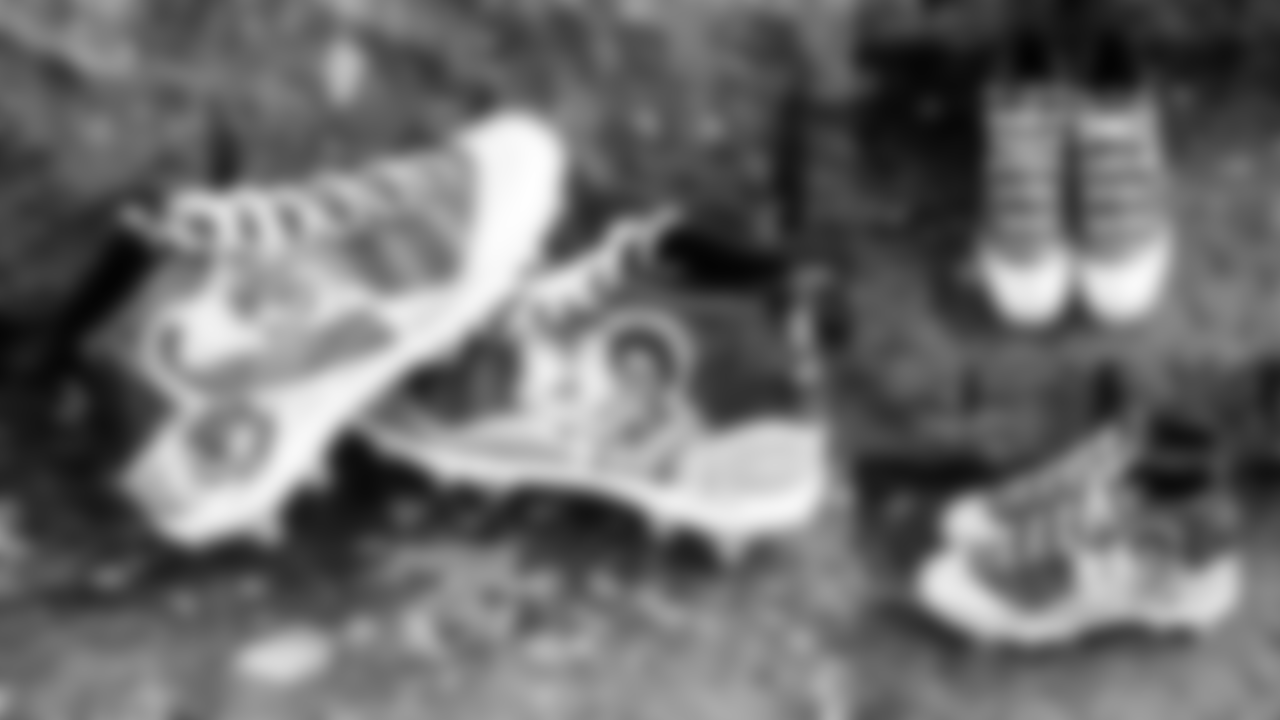
DE Frank Clark
Cause: Bladder Cancer Awareness
Clark: "My cause is bladder cancer. This cause is important to me because someone I call, really one of the cornerstones of our family, one of the most important people in my life that I have ever come across- not God-but I look at her like my savior, my grandmother Valerie. Being able to represent her in a way, using this platform to bring awareness to the cause of bladder cancer as I continue to do, what better way to celebrate her. I want to bring awareness to it because I feel I have the perfect platform to do so. For something that can take lives, there should always be some type of knowledge, some sort of note. It should be talked about more. It took my grandmother's life. I receive many DMs or tweets from people that were affected the same way and I feel for them the same way that I felt when I lost mine. It needs to have attention brought to it, and the one thing I'm going to continue to do as long as we have My Cause, My Cleats you'll continue to see purple and gold representing bladder cancer, the bladder cancer ribbon. Also, purple being my grandmother's favorite color, it just so happened to fall into that. So, you'll continue to see who I'm representing and why I'm representing year to year as long as God allows me to play this sport and then you'll see me representing after the fact. We just have to keep on bringing awareness to it."
Artist: CusTheArtist
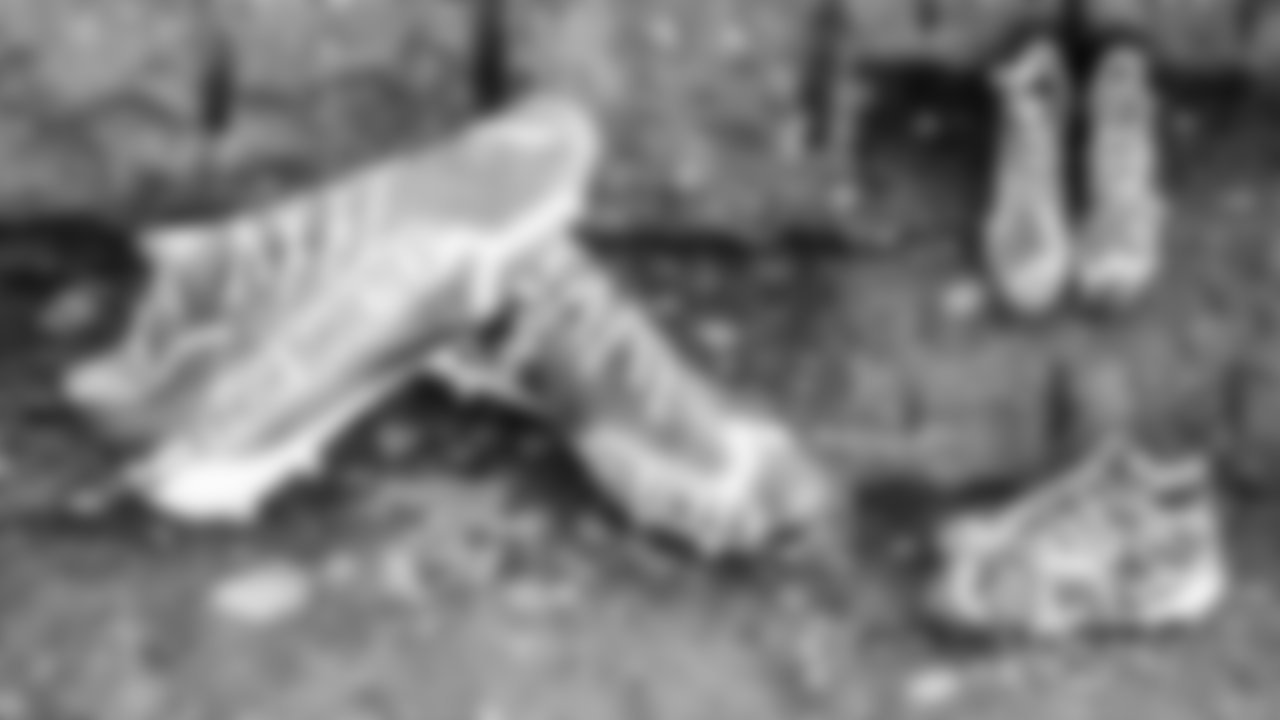
CB Justin Coleman
Cause: Diabetes Awareness
Coleman: "I really chose it because diabetes runs in my family. My grandmother, my dad and a few other family members all had diabetes and a couple of them passed away from it. The main reason I chose it was to help find a way to get rid of it and minimize diabetes."
Artist: KSHAFFSTALL KICKS
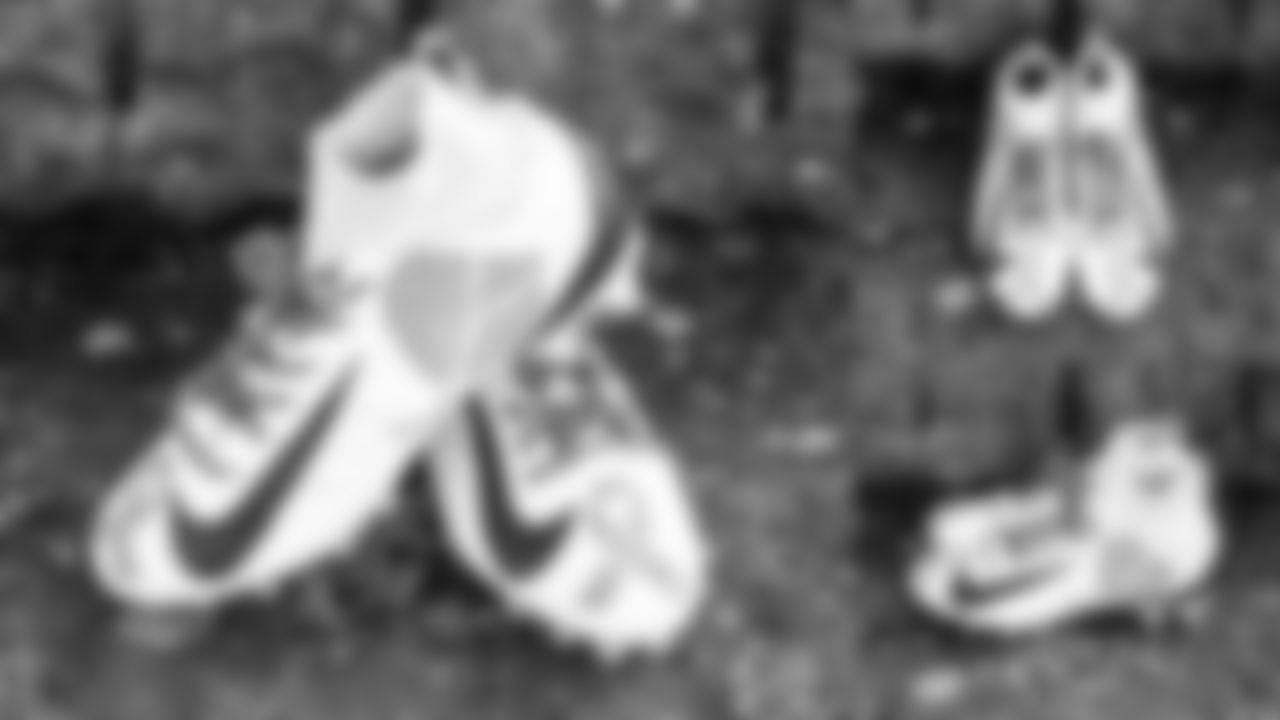
RB Mike Davis
Cause: Prostate Cancer Awareness
Davis: "My cause is prostate cancer. I chose prostate cancer because a little over a year ago my dad told me that he has prostate cancer. I'm hoping that people will go and get scanned early. When you get scanned early and they say it's in the early stages there is a greater chance of them catching it before it spread to their bones. So I'm hoping that people will go and get scanned and make sure they don't have cancer and if they do, they can catch it right away."
Artist: KENDALL ROQUE
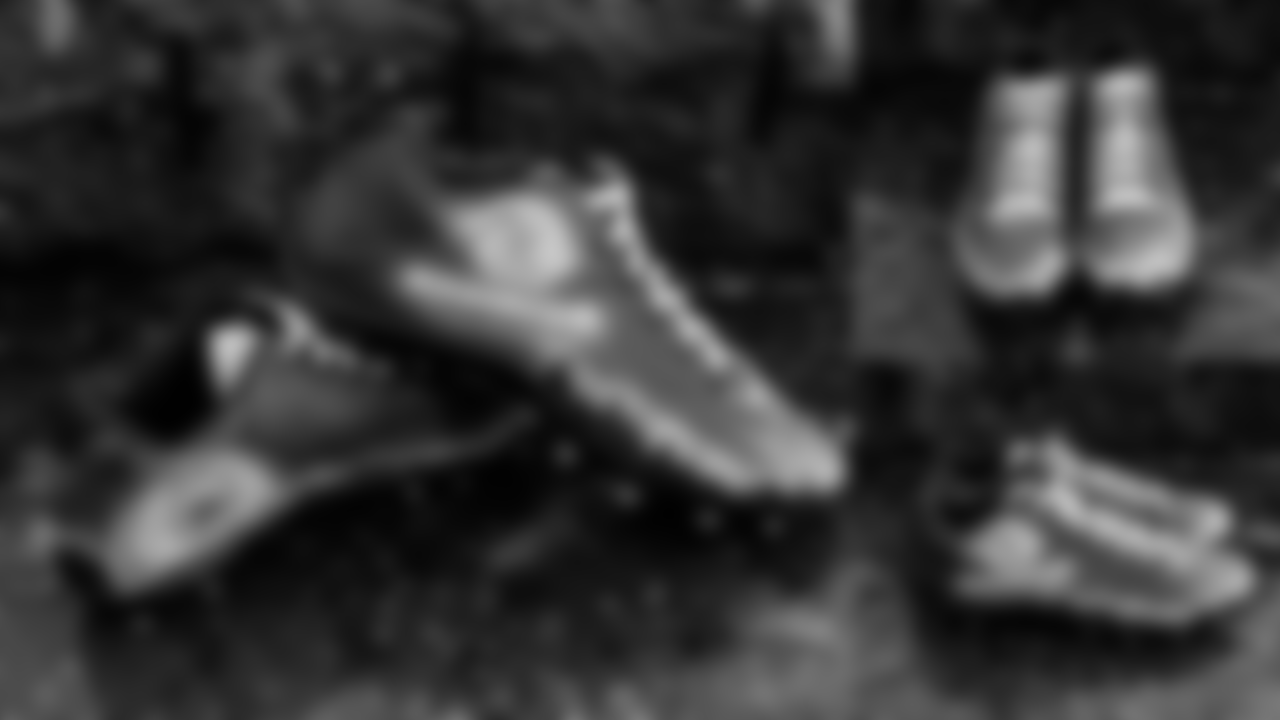
TE Ed Dickson
Cause: Boys & Girls Club of Emerald Valley
Dickson: "I've been dealing with them for a long time. The Boys & Girls Club, I used to go there a lot when I was in college and we did a lot of hands-on work so it's easy to take over that foundation and I've been dealing with them for a long time. We actually host an event every year to raise about $100,000 a year to keep their doors open. It's kind of a way that I can affect 275 kids that all in one spot, so that's the reason I'm supporting it – it's kind of special to my heart."
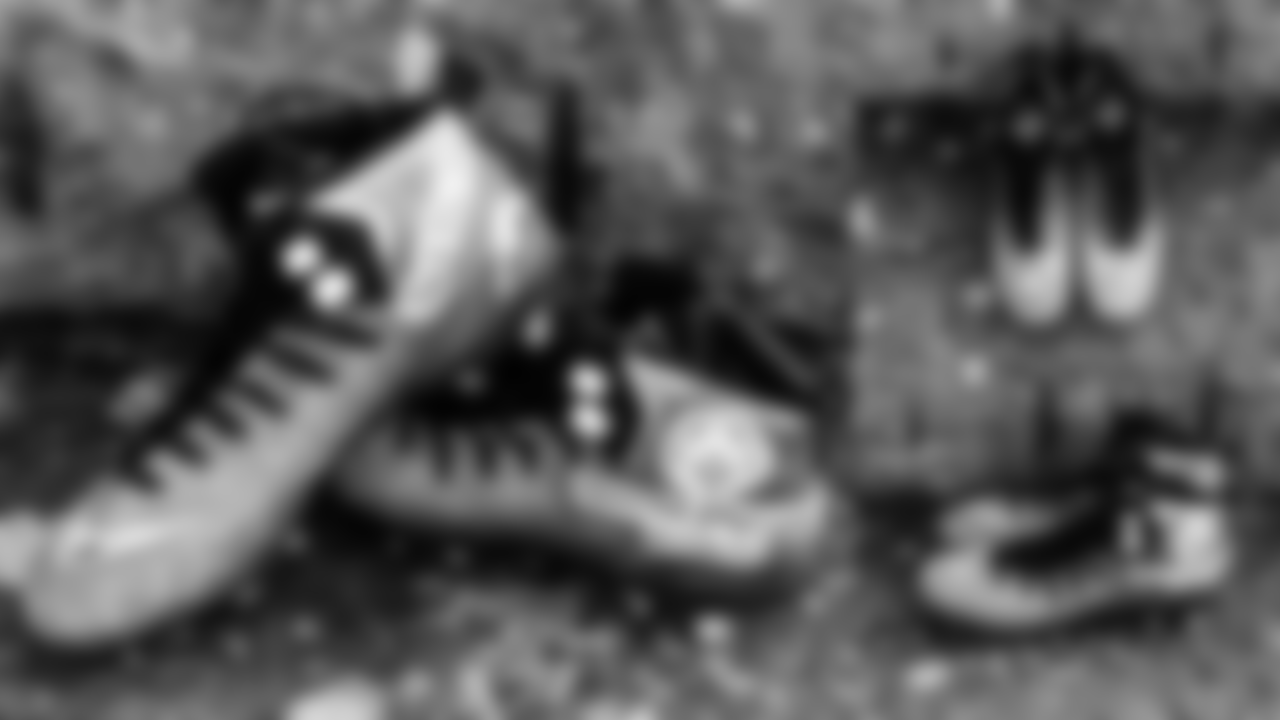
T George Fant
Cause: Special Olympics Kentucky
Fant: "I grew up in a household where my mom always worked with kids who had special needs. I always had people that lived in my house with special needs my whole life, so it's always been close to me. I know a lot of people personally who go through it every day and it's just something I wanted to bring light to."
Artist: D-ROSS
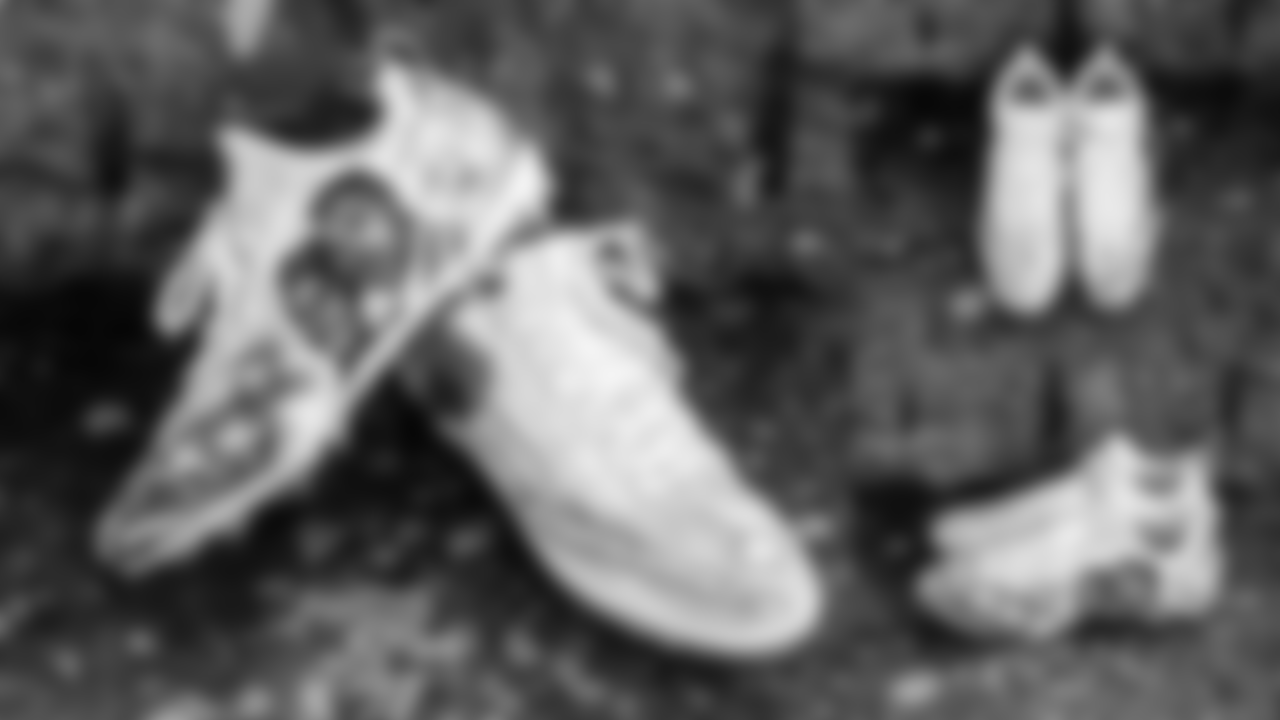
CB Tre Flowers
Cause: Alzheimer's & Dementia Awareness
Flowers: "Both of my grandparents have it and just growing up around it, I wanted to help make people more aware."
Artist: D-ROSS
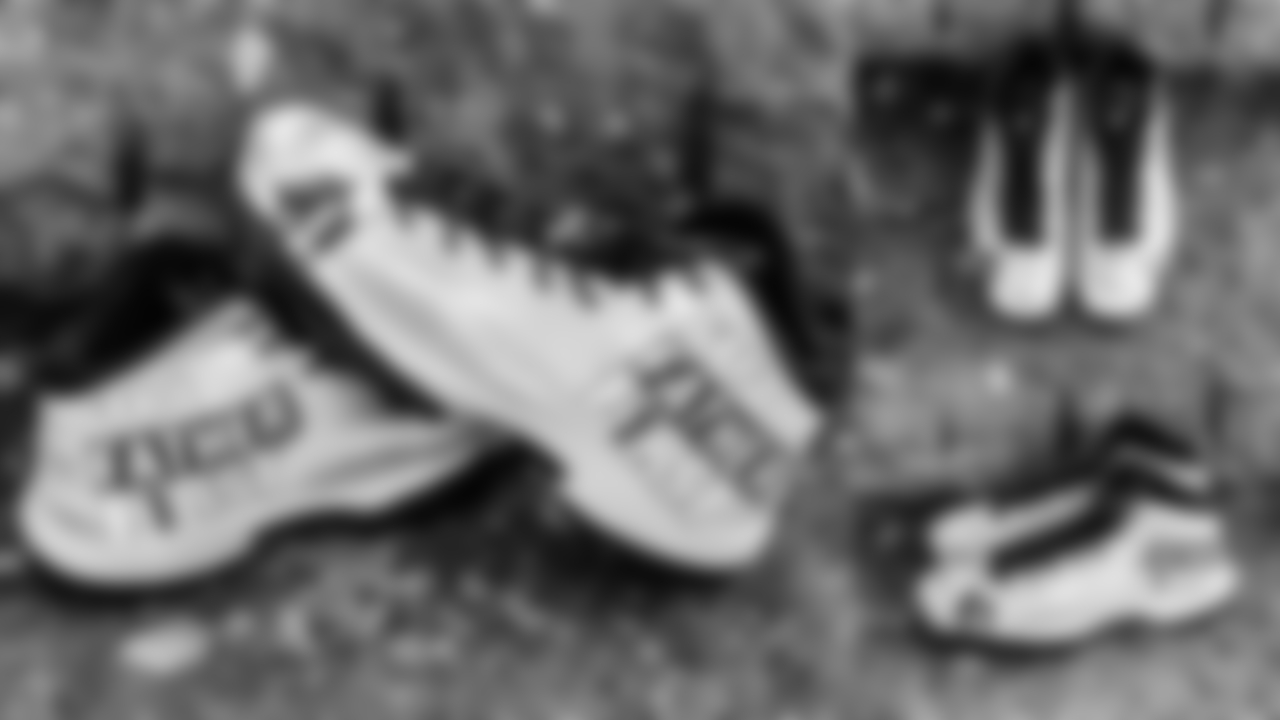
G D.J. Fluker
Cause: I'm A Father F1rst
Fluker: "I chose it because I think it's always important to represent being a father. That's a big problem today, so that's what I picked."
Artist: D-ROSS

DE Rasheem Green
Cause: SKIP (Save Kids of Incarcerated Parents)
Green: "I chose SKIP because the program is for kids who have parents in prison and I grew up with my dad in prison for the first twelve years of my life, so that was something I could relate to so that's why I chose it."
Artist: SEAN VERGARA

CB Shaquill Griffin & LB Shaquem Griffin
Cause: St. Pete Nitro Track Club
Shaquill: "It was inspiring to do our own thing. We notice how important it was to others that we created it (St. Pete's Nitro). Maybe this is our calling. Maybe we should do more for the community, for the city, for kids, for people. Ever since then, we've always found a way to give back to others."
Shaquem: "The reason for 'My Cause, My Cleats' is because I wanted to create something that can always give back to the community. It was never about me, it was never about running track – I think my cause and picking St. Pete Nitro was something that was more than just sports. It was a foundation that created a home for those who felt like they didn't have one."
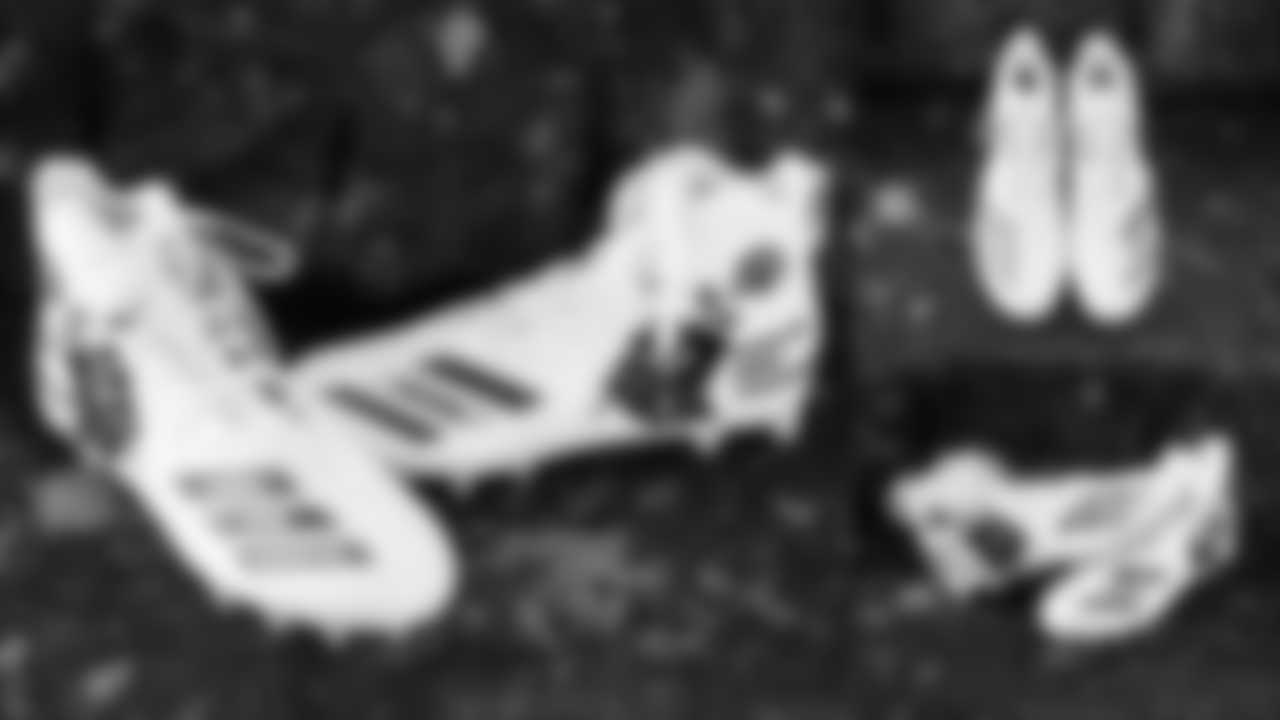
QB Brett Hundley
Cause: Hundley Hero Foundation (epilepsy & childhood cancer)
Hundley: "It's something my wife and I started when we first wanted to enter the non-profit world. The broader thought of the Hundley Hero Foundation is everyone can be a hero in the community no matter if it's one person. Giving back to the community is the biggest thing, but also doing other things within that like epilepsy. Hopefully soon, we'll get into autism."
Artist: A.CODD
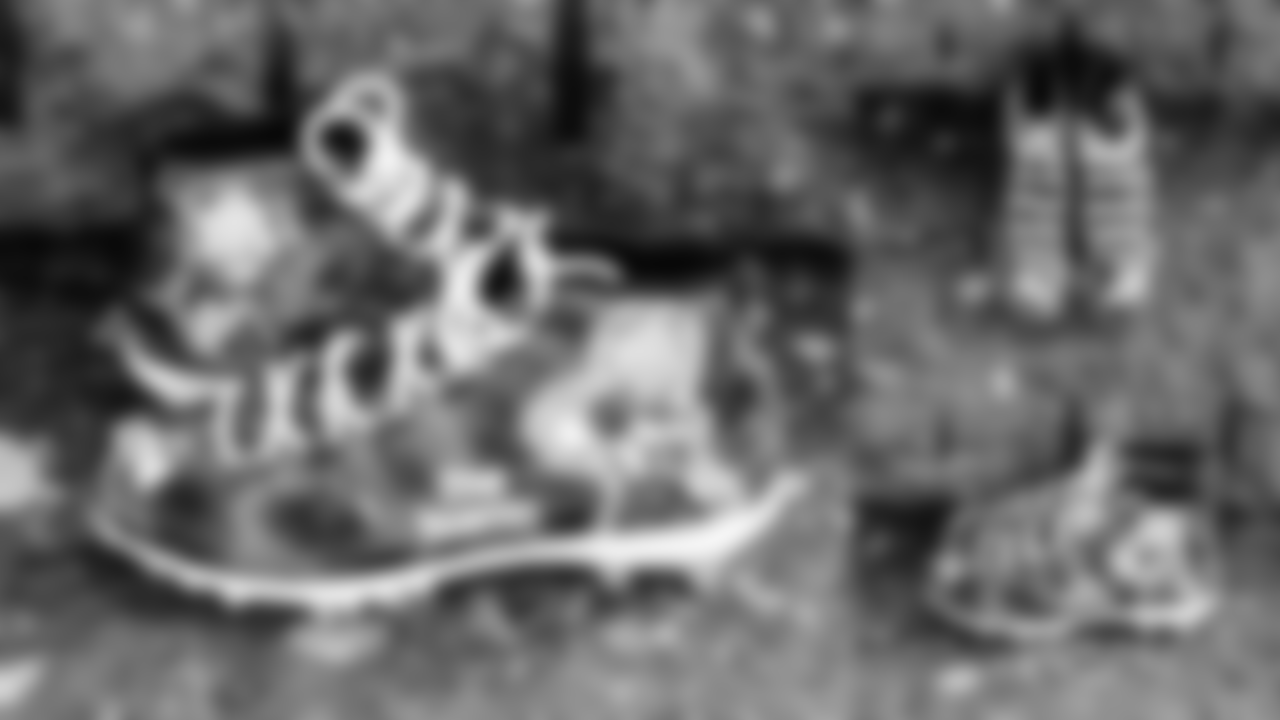
DE Branden Jackson
Cause: American Diabetes Association
Jackson: "I picked it for my grandmother who has diabetes. I like to try to raise awareness for her because she's everything that I am. It's kind of a token of gratitude to raise awareness for a lot of people who are living with the disease."
Artist: KSHAFFSTALL KICKS

K Sebastian Janikowski
Cause: Crohn's & Colitis Foundation
Janikowski: "This is important to me and to (my wife Lori) for people to understand more about Crohn's. Because a lot of people keep it to themselves, they don't talk about it because they're embarrassed to talk about it, they don't want people to know. I think it's a great cause, and that's why we're supporting it."
Artist: KENDALL ROQUE

DE Quinton Jefferson
Cause: Jordan McNair Foundation & Gun Violence Prevention
Jefferson: "The first cause is Jordan McNair (University of Maryland football player who passed during training), bringing awareness to his foundation, and the whole situation so people don't forget about him. That's one cause. My second cause is about gun violence, especially in the African American community. I'm going to have a list of all the people I know personally who have been killed by gun violence. It's just eye-opening, because it's like 30 people on there, people I personally know who have been killed. It's eye-opening, so I just want to bring awareness, this has to stop."
Artist: POSSI
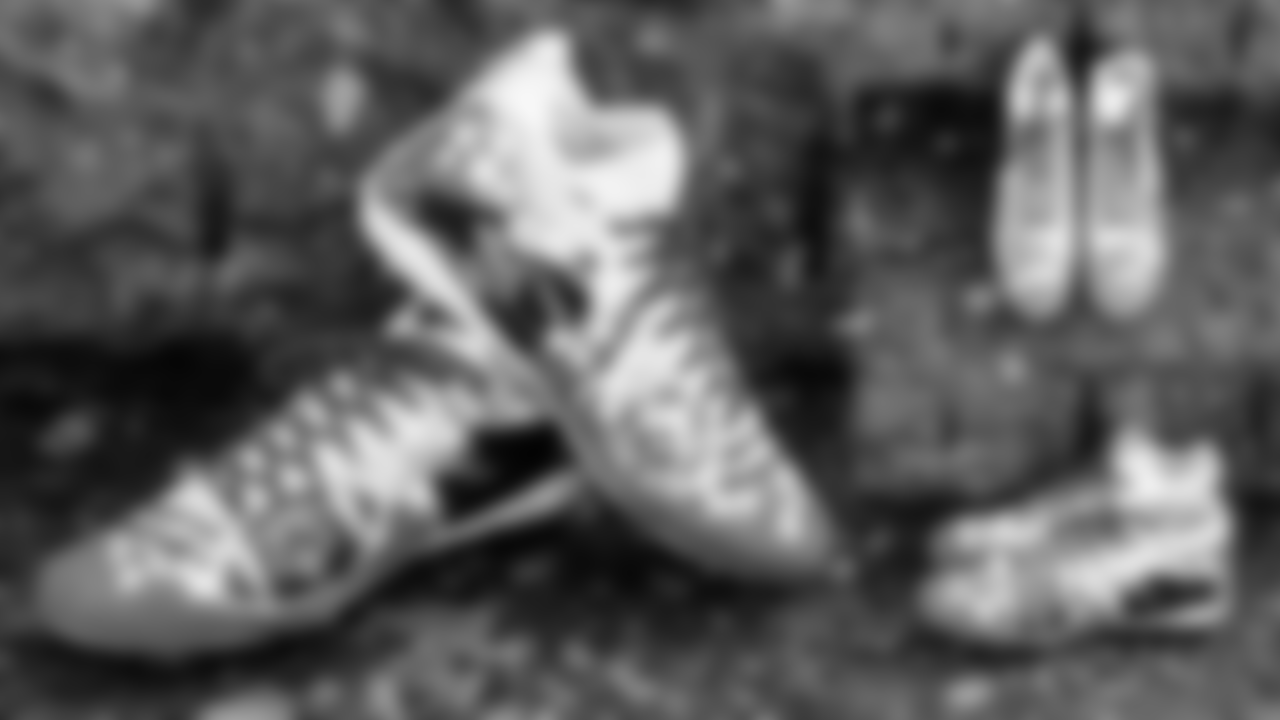
DE Dion Jordan
Cause: Special Olympics Washington
Jordan: "My cause is Special Olympics Unified Washington. I chose the Special Olympics because I had the chance to go this summer here at the University of Washington and watch the flag football team compete. It was my first time at a Special Olympics event, and I enjoyed it. I had one of the best times watching the athletes go out there and compete. I just continued to go back because I enjoyed watching these guys the way they loved on each other regardless of what team they were playing against, and the level of competition that I seen while I was there. I think they enjoyed it a lot because they saw a professional football player come and show them love and football. It was big for me as well to watch them go out there and compete. The biggest thing that resonated with me was the love that they have for each other. These guys, they compete very, very, very, very hard but at the same time they encourage each other, and I think that's the biggest thing about sports. You know it is about winning and losing but at the end of the day you are out there with people that have worked as hard as you have even on the other team and at the end of the day you want people to succeed and excel and that's what I noticed. The most rewarding part of it all was watching those guys love on each other. Personally, I feel like they are the toughest athletes on the planet. To overcome everything that has been stacked against you to go out there and make it. Not only are you competing but they are doing it with people that love and care for you. For me that was the biggest thing that I took from the event. It was very much more rewarding for myself. Mainly because at this level, at the professional level it's easy to lose why you are doing what you are doing because they're a lot of things that come with it. But what it boils down to it, we all started this game because we love to play this sport and it reminded me of that."
Artist: CusTheArtist
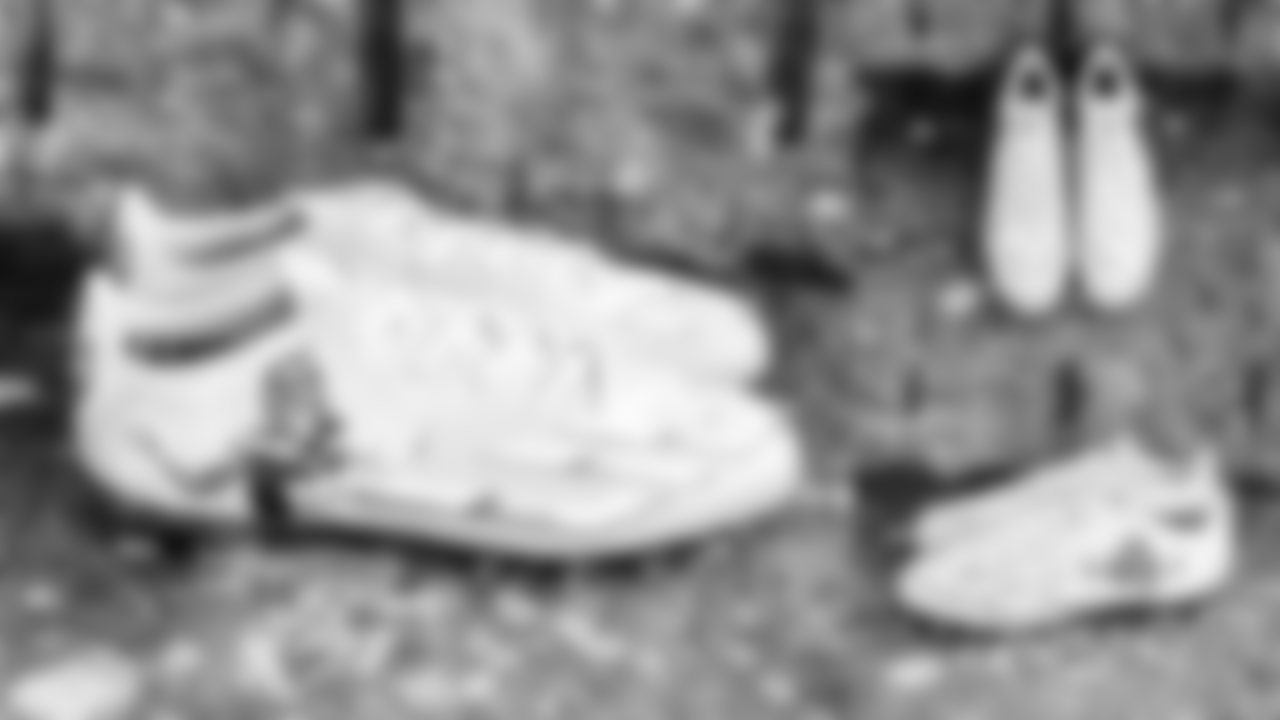
WR Tyler Lockett
Cause; Light It Up Foundation
Lockett: "I chose the Light It Up Foundation because it's my foundation and the thing that I love about my foundation is that it talks about everybody deserving a chance to shine, not only in the sports world and entertainment world but also in the lives of others. Everybody deserves a chance."
Artist: D-ROSS
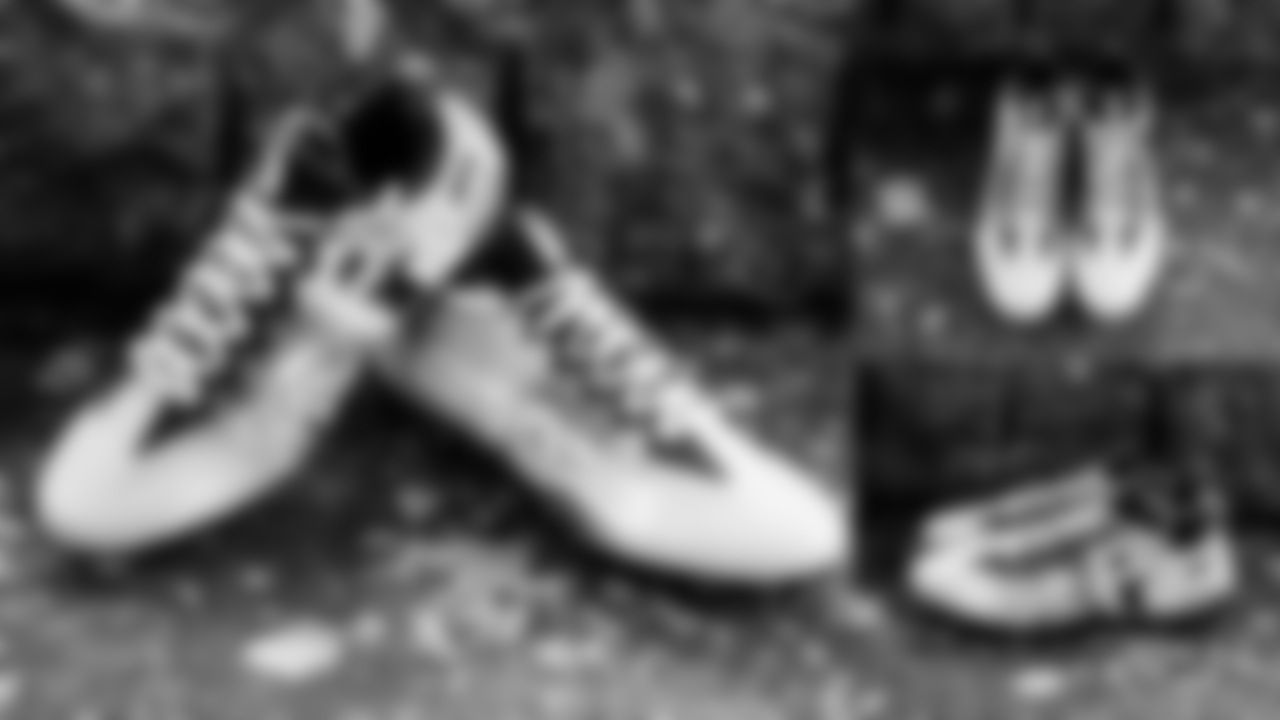
S Bradley McDougald
Cause: Make-A-Wish
McDougald: "I chose Make-A-Wish just because it was an organization that helped my family a lot when my brother was dealing with cancer back when he was in 5th grade and they took great care of us. I just wanted to give back to them."
Artist: CusTheArtist
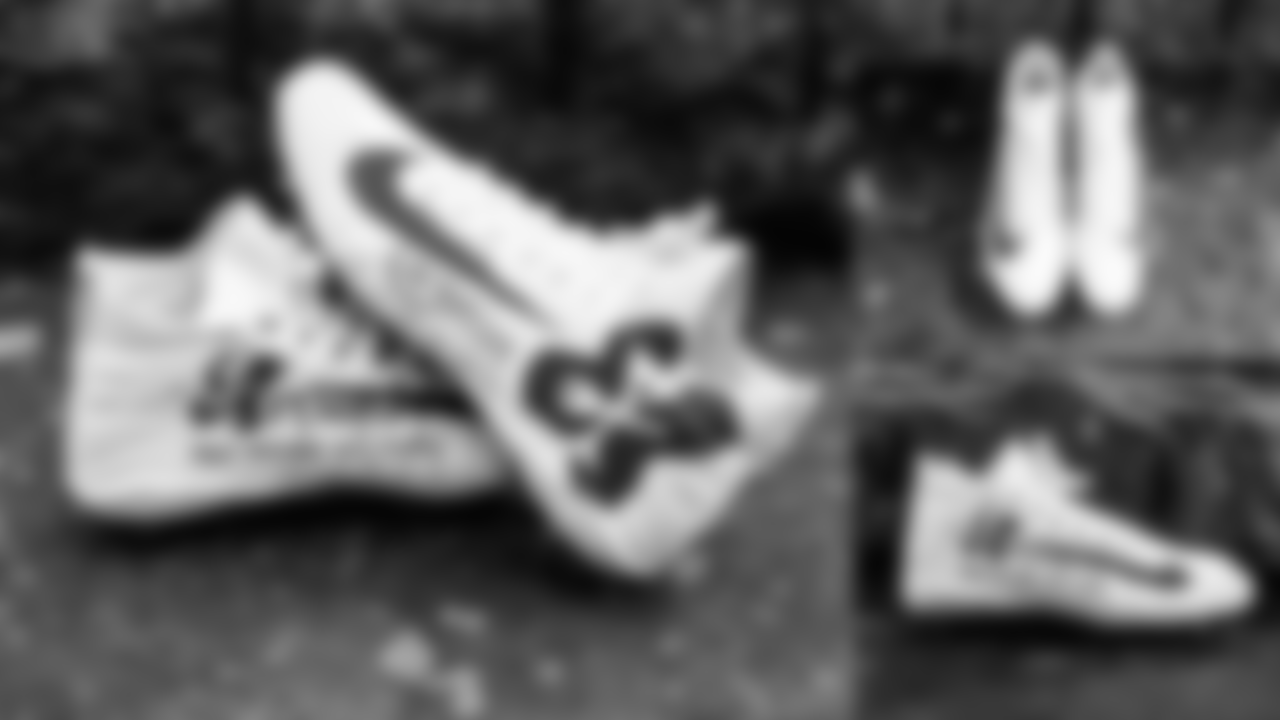
DE Jacob Martin
Cause: Make-A-Wish & Mothers Against Drunk Driving
Martin: "I work closely with both of those organizations in college and in high school. I've put on different events with M.A.A.D. when I was in college at Temple and also different events with Make-A-Wish in the past. Those are two causes that I work closely, have a relationship with and know the most about."
Artist: KENDALL ROQUE
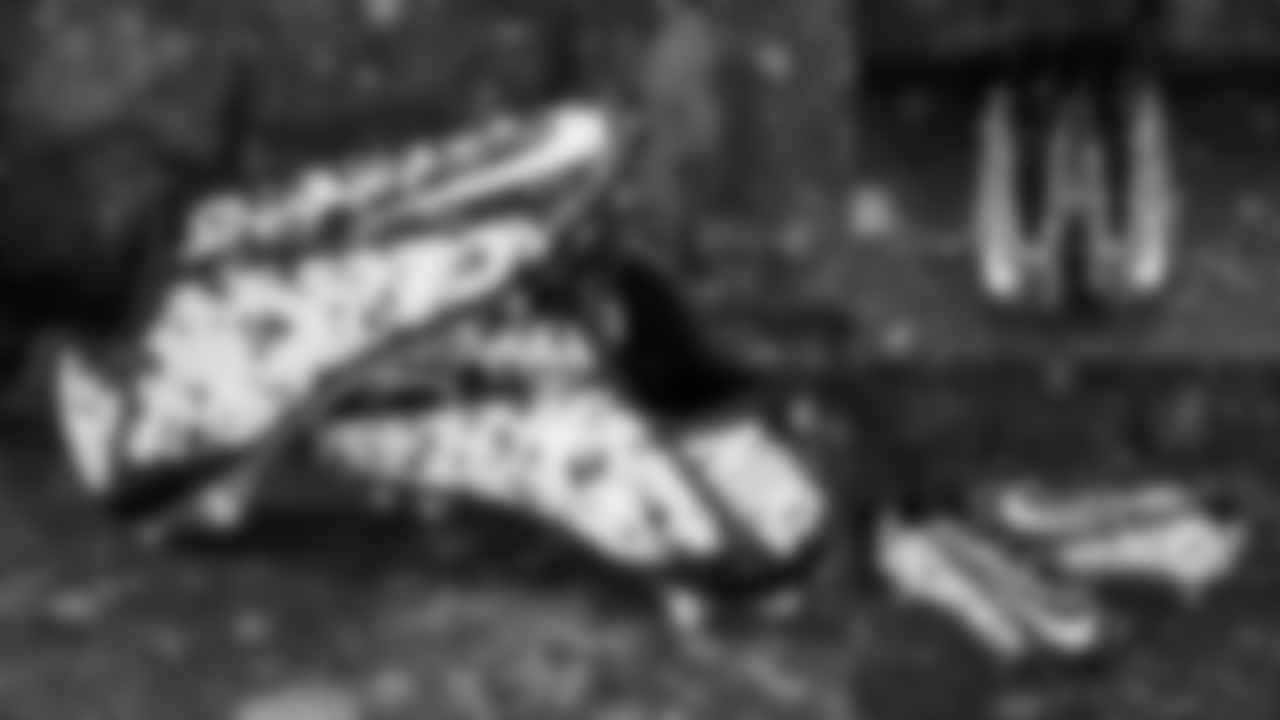
RB J.D. McKissic
Cause: PAWS
McKissic: "I chose PAWS because a lot of people have animals or dogs, and there are a lot of homeless dogs and a lot of people have female dogs and are just mating and they don't have homes for the puppies. I think that goes over a lot of people heads and they don't talk about their animals and take care of them well enough."
Artist: SEAN VERGARA
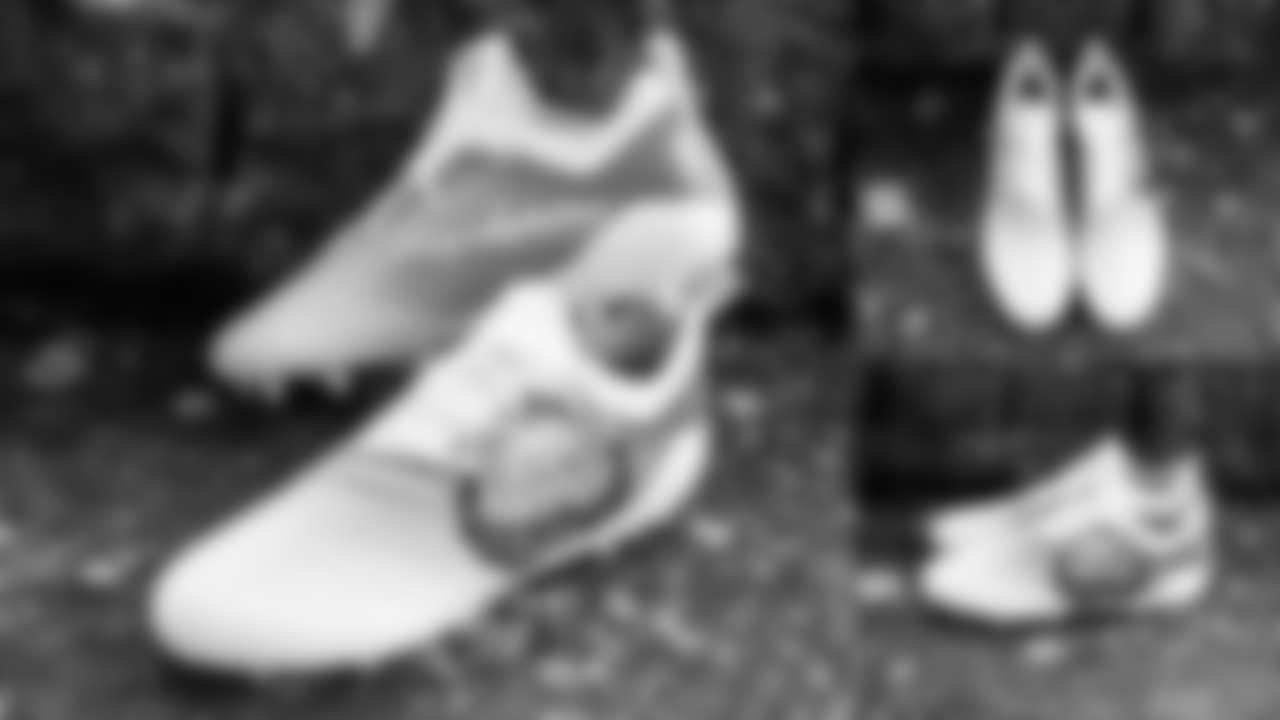
WR David Moore
Cause: Brain Cancer & Neurofibromatosis Awareness
Moore: "I chose my cause because there was a kid back where I went to college at. He was a family friend of the girl I was dating and she brought him around, and he had NF – which is a brain cancer and he's a sweet kid and he was a little soldier, so that's why I picked my cause."
Artist: SEAN VERGARA
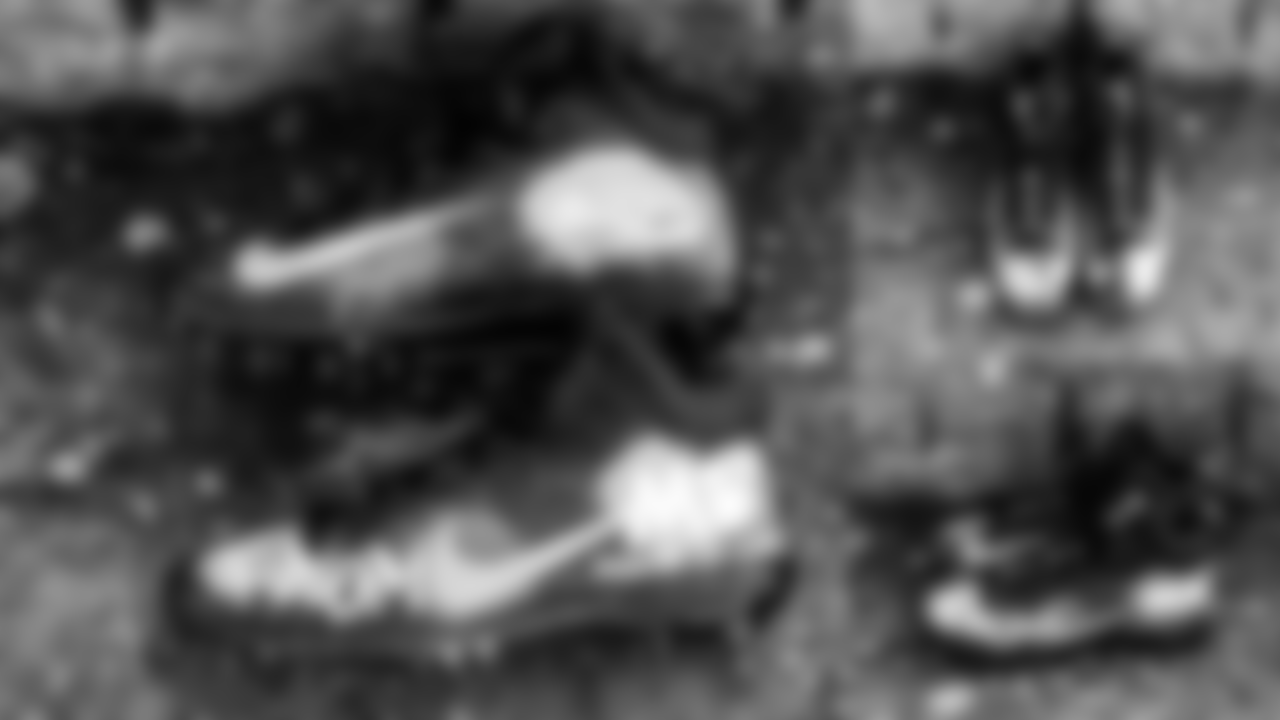
LS Tyler Ott
Cause: March of Dimes
Ott: "The reason I chose March of Dimes goes back to when I was born pre-maturely a month early. I was healthy and everything, but I stayed in the NICU for over a week. My mom has been involved and working with March of Dimes for a long time now. It's for a great cause that really hits close to home – it's really close to my heart, my mom's heart, having experienced part of it. I was lucky, I was healthy and I've grown up to be the 'success story', but it hits close to home with some of the families that maybe aren't as lucky. It's a cause I've supported for a long time and I think it's a great mission for healthy babies and healthy moms."
Artist: PAUL KING
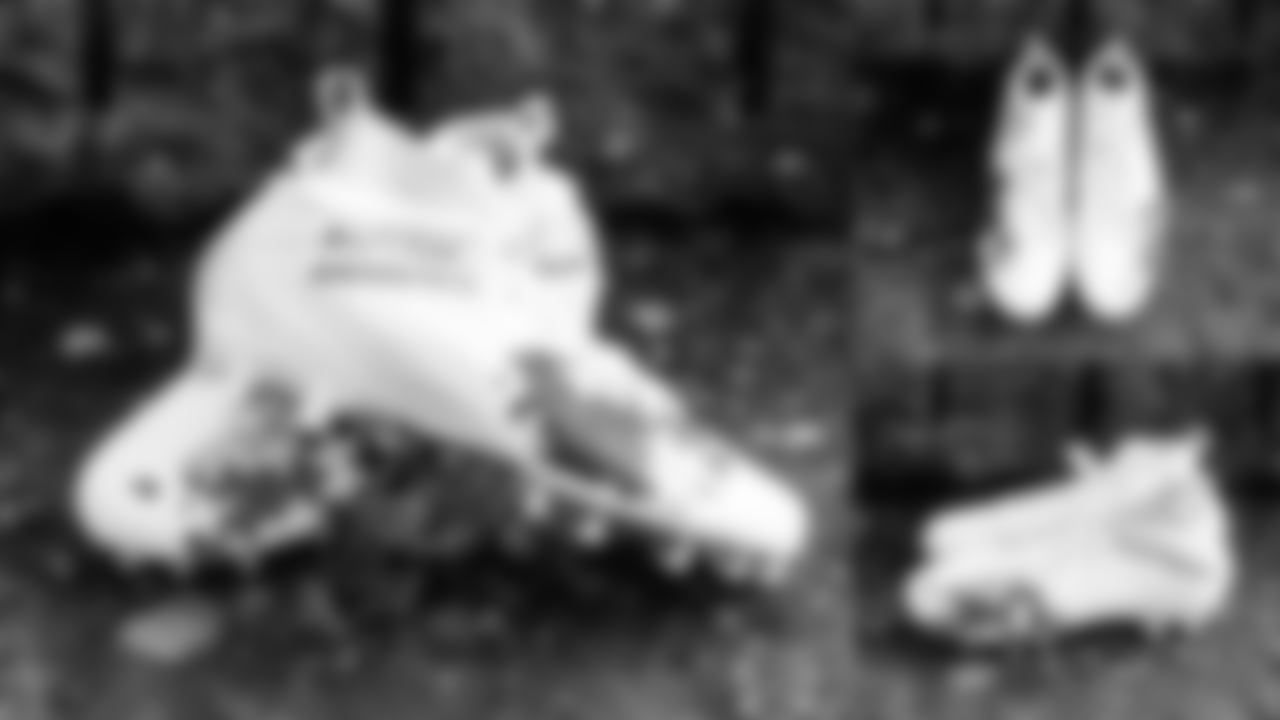
RB Rashaad Penny
Cause: Autism Awareness
Penny: "I chose it because my cousin has autism and I just wanted to support him."
Artist: KSHAFFSTALL KICKS
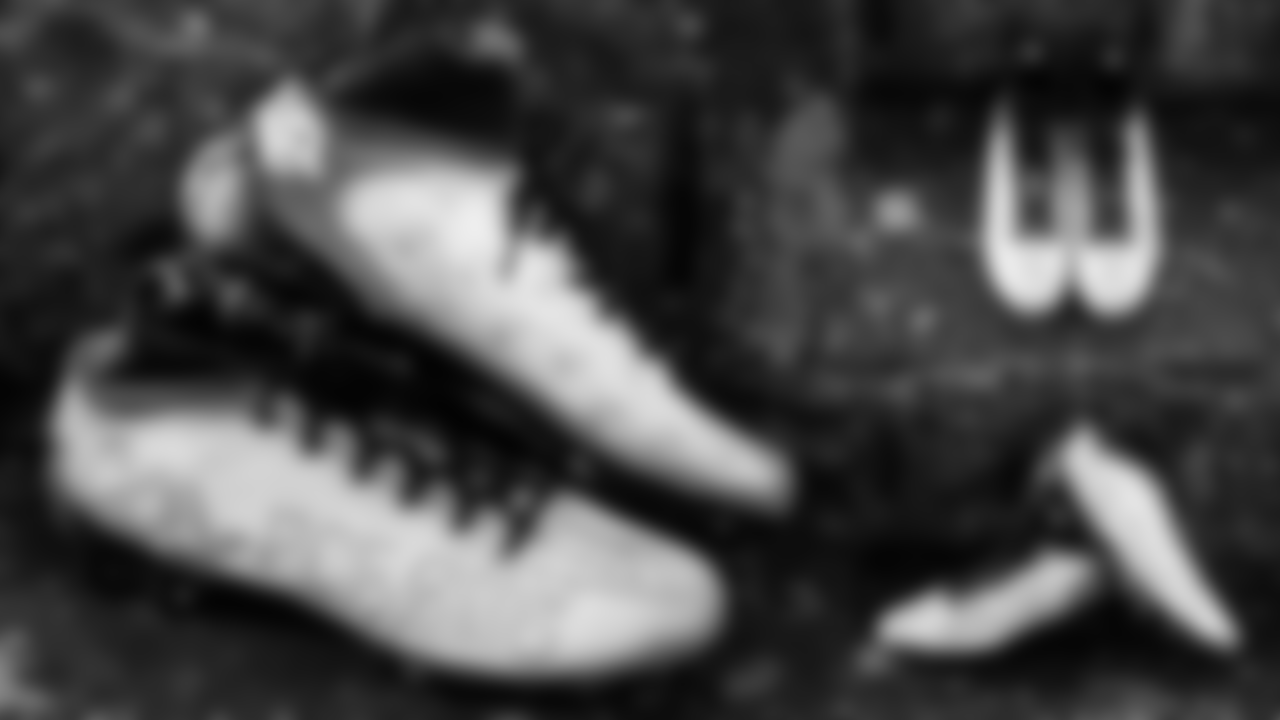
RB C.J. Prosise
Cause: Prostate Cancer Foundation
Prosise: "I chose it because of my grandfather recently passed away from it. I wanted to bring awareness to it because it is something near and dear to my heart and I wanted to do something to support it."
Artist: BRITTISH CUSTOMS
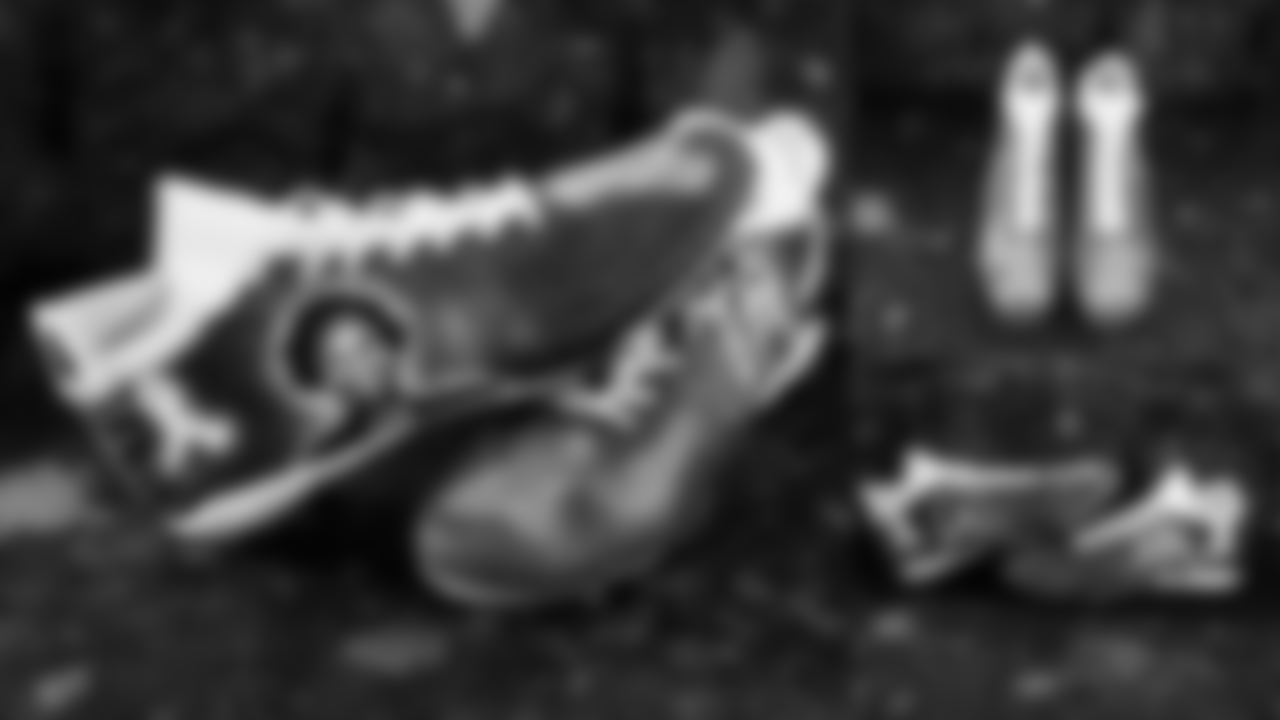
DT Jarran Reed
Cause: Alzheimer's & Diabetes
Reed: "My grandma has Alzheimer's and I just wanted to show appreciation to her. A couple people in my family have diabetes too, so I just wanted people to stay aware of things that go on, especially health issues."
Artist: CusTheArtist
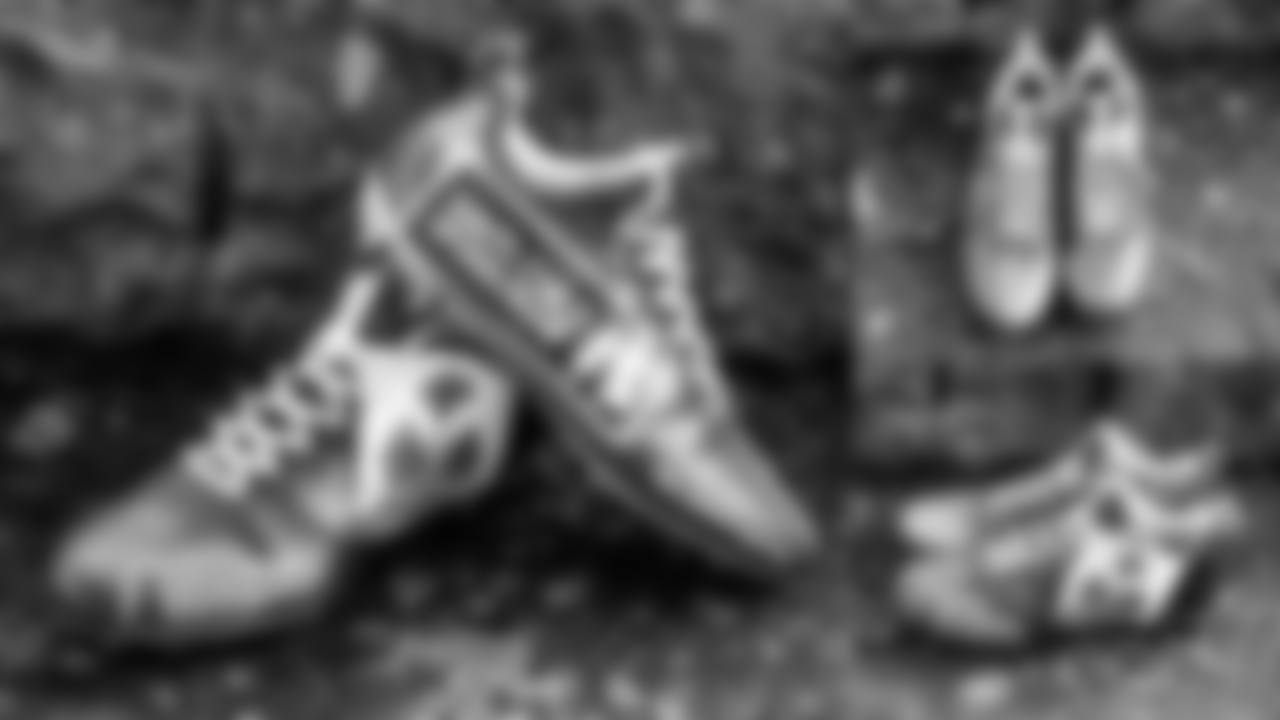
WR Caleb Scott
Cause: Haiti Child Sponsorship
Scott: "I've had the chance to go to Haiti a number of times and each time I'm blown away by how awesome the people are. In 1982 my Grandad, Charlie Scott, started a school in Haiti called The Good Shepard School. Today the school has 1,200 students and 42 teachers and staff. Haiti Child Sponsorship funds the operations of the school and also supports local projects where poverty is the norm. It also supports the work of YoungLife Haiti where leaders reach out to the kids in their community to teach them about Jesus. Together we believe we can build a better Haiti!"
Artist: D-ROSS
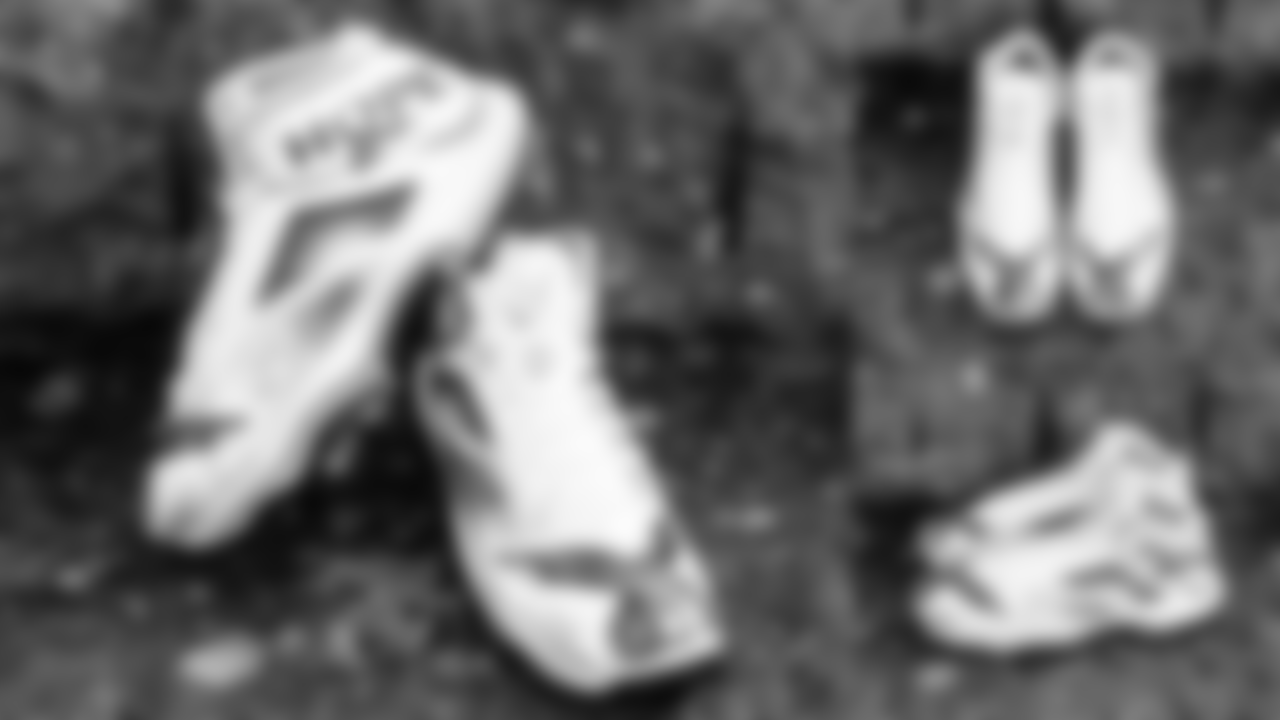
G Jordan Simmons
Cause: Breast Cancer Awareness
Simmons: "My grandmother is a breast cancer survivor, so I just wanted to do a dedication to her overcoming breast cancer. I am supporting this cause for her, and anyone else who has gone through it."
Artist: D-ROSS
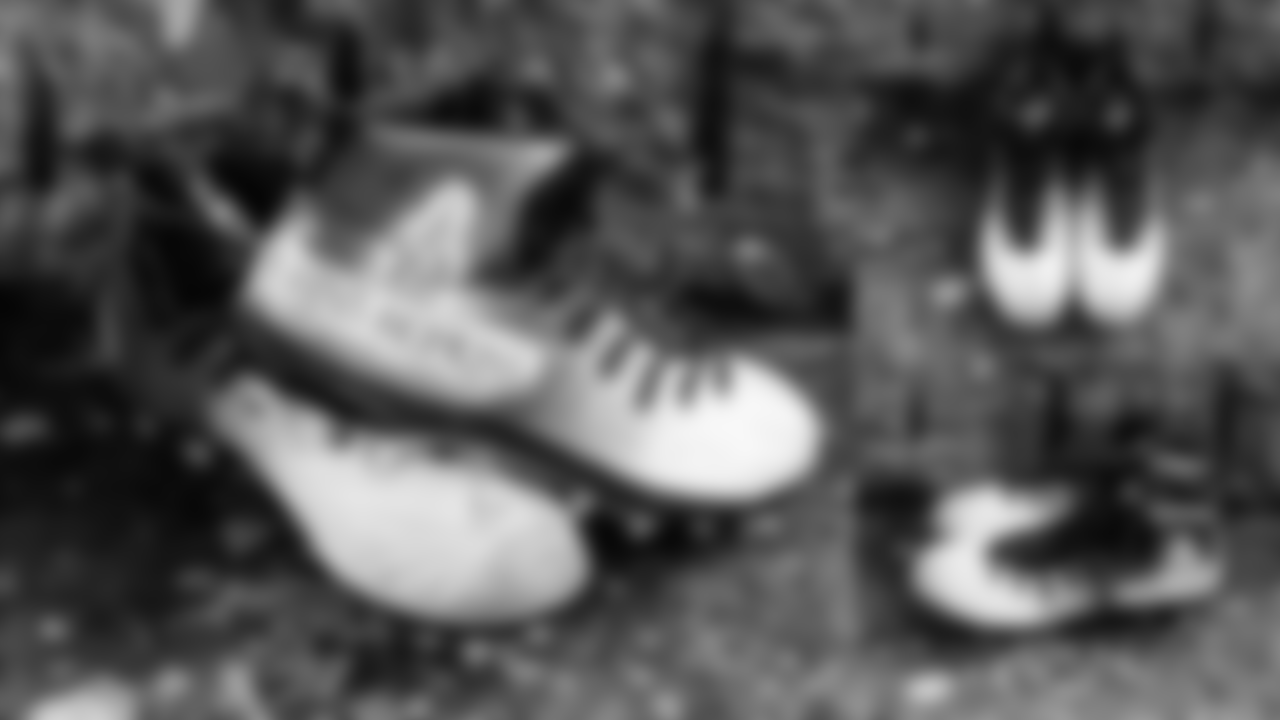
G J.R. Sweezy
Cause: Johns Hopkins All Children's Center
Sweezy: "After having children of my own, just knowing the struggle of people that actually have to use the Children's Center, I couldn't imagine it. It's a good cause and the more help they get, the better."
Artist: D-ROSS

S Tedric Thompson
Cause: Youth Justice Coalition
Thompson: "I'm from Los Angeles, so I grew up around a lot of gangs. A lot of my friends are in gangs right now, so my cleats, one will be red, one will be blue to symbolize Bloods and Crips, then there's a peace sign between both of them to try to put awareness towards gang violence and try to stop it. I'm also bringing awareness about prison reform—there's a lot of stuff that goes on inside of prisons we don't really know about. Every time you hear about a prisoner, you automatically think it's a bad person; that's not the case. So I'm talking about how to improve the living conditions in prison, and about harsh sentencing for non-violent offenders. Also, gang culture, it starts young, so on the other side (of the shoe) there's going to be a school to symbolize that you need to be teaching kids in school what they need for adulthood, stuff like taxes that they don't really teach you about. Being in the inner city, when you get to adult life you kind of get sidetracked by it."
Artist: CusTheArtist
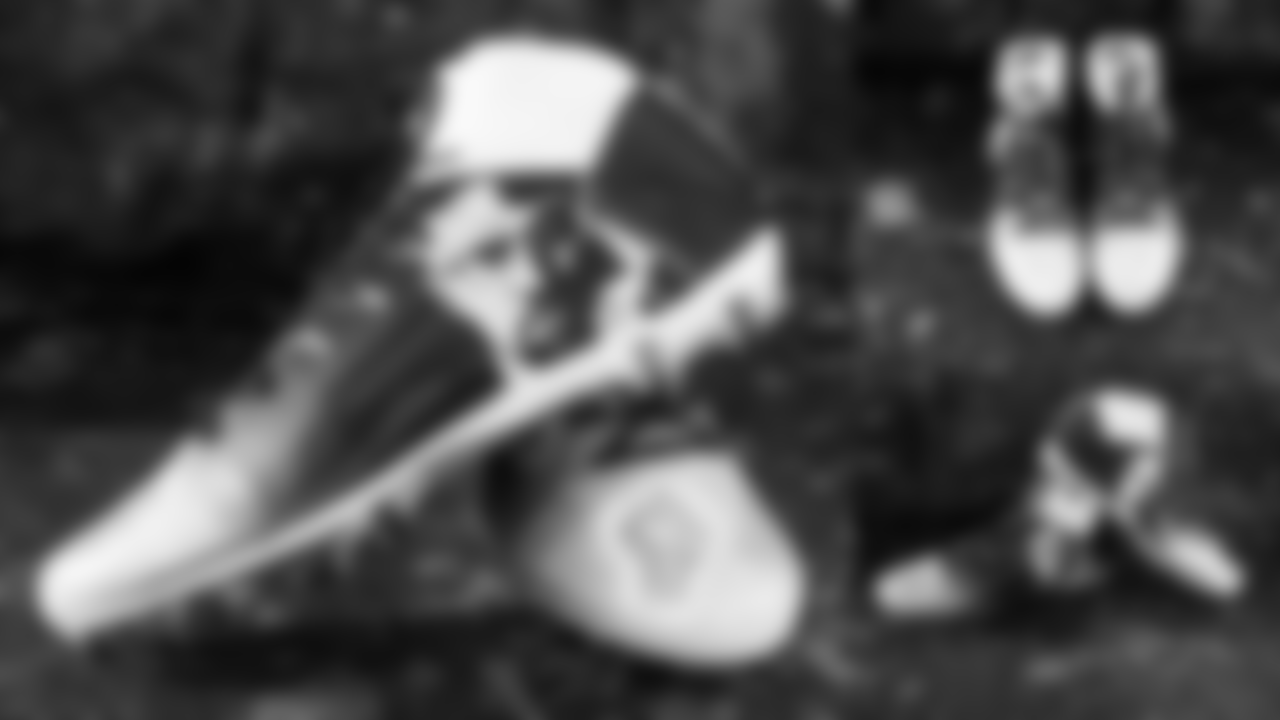
CB Neiko Thorpe
Cause: Black Lives Matter
Thorpe: "I chose Black Lives Matter because black lives do matter."
Artist: CusTheArtist

WR Malik Turner
Cause: Uplifting Athletes Rare Disease Awareness
Turner: "I chose my cause for my cleats because the organization that I'm doing it for, they represent a lot of colleges and they go and they have Lift For Life, where they raise money and awareness for kids with rare diseases. That was the first connection I had to an organization so I just wanted to carry it onto my next level of football and see if I can impact someone else."
Artist: KENDALL ROQUE
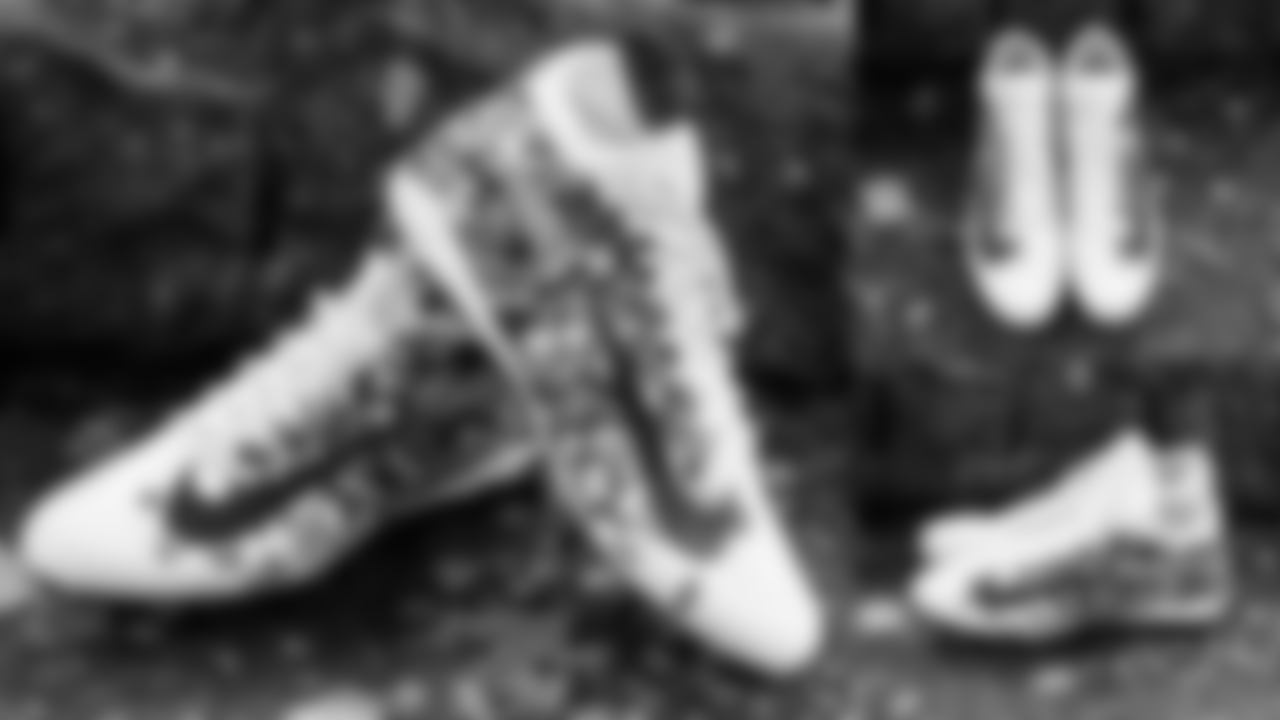
TE Nick Vannett
Cause: Never Ever Give Up Jessie Rees Foundation For Childhood Cancer
Vannett: "I've partnered with 'Never Ever Give Up' the last few years. During the offseason, we go visit various hospitals and drop off these toy jars that we call joy jars that have things inside to keep them occupied and keep their minds off of everything that's going on. In addition, we just keep encouraging to keep fighting and to never, ever give up. I get so much joy out of that just because of how happy the kids are just to see us and it's almost like they forget the reason they are there for a moment."
Artist: SEAN VERGARA
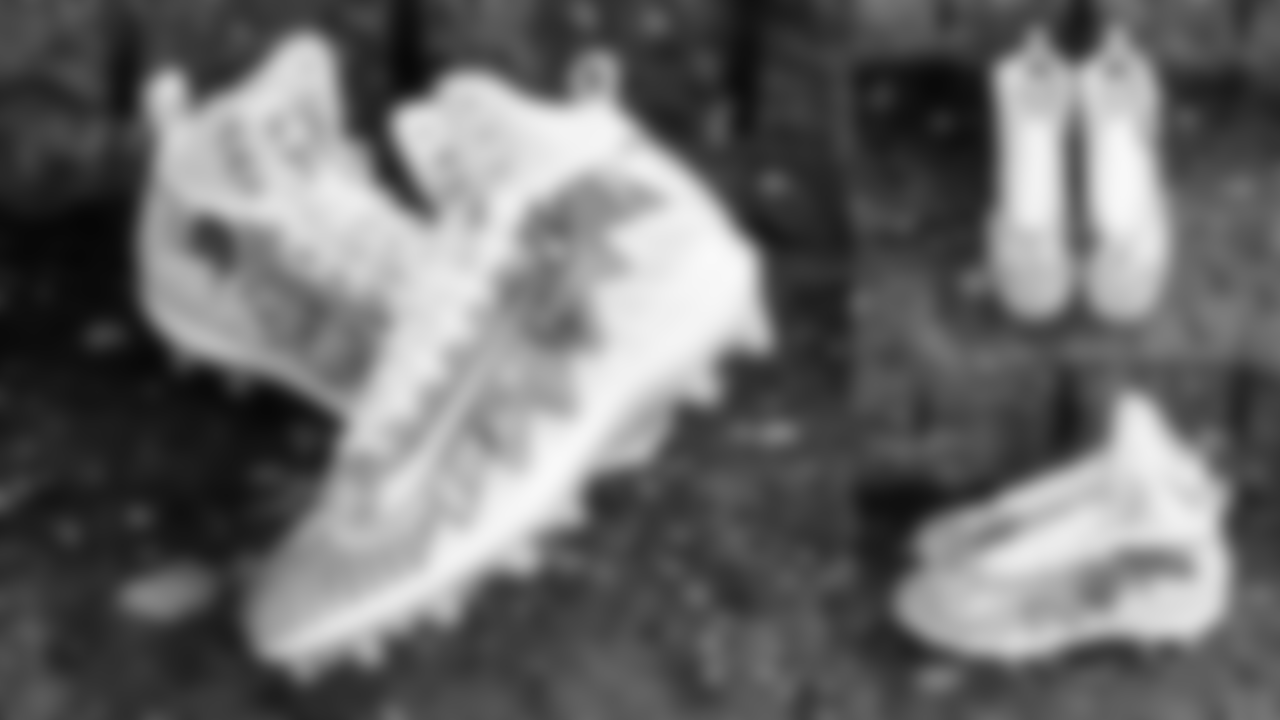
QB Russell Wilson
Cause: Why Not You Foundation Supporting Friends Of The Children
Wilson: "The main focus of the Why Not You Foundation is to make dreams come true. Our mission is to change one kid's life at a time and do some impactful, impactful things. Really make kids and people believe that anything is possible."
Artist: SYDNEY NOLAND
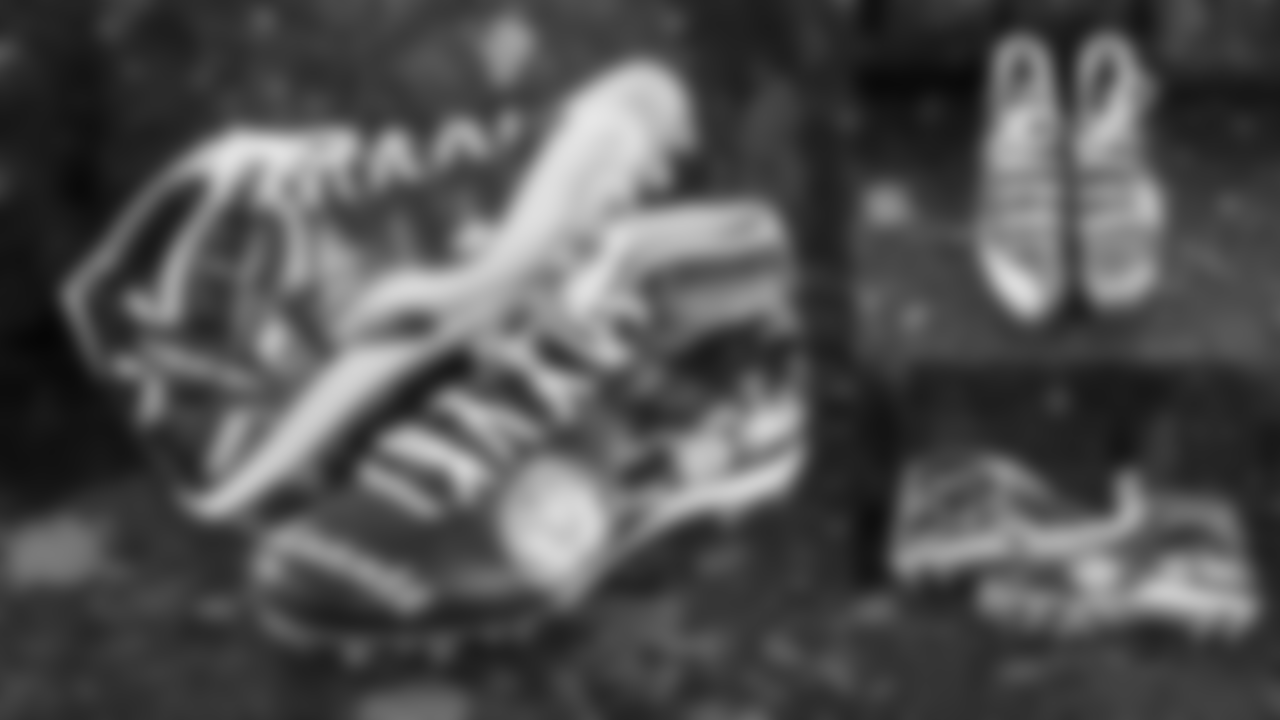
LB K.J. Wright
Cause: Clean Water | Healing Hands
Wright: "My cause is building clean water wells in Kenya. I wanted my cause to focus on building water wells because I think it's really important that everyone has access to clean water. A lot of people don't' have that access and many people have to walk miles for it. When they do get the water, it's dirty. I just wanted to bring awareness to it and let a lot of people know that a lot of people struggle in this part of their lives. When I visited Kenya, I visited a school and I noticed that the children had dirty water. I asked people in the community what the situation was and how can we make this better? And they just said they don't have access to clean water, and they have to walk many miles. So I just wanted to build one in a primary location so that everyone has access to it."
Artist: CusTheArtist
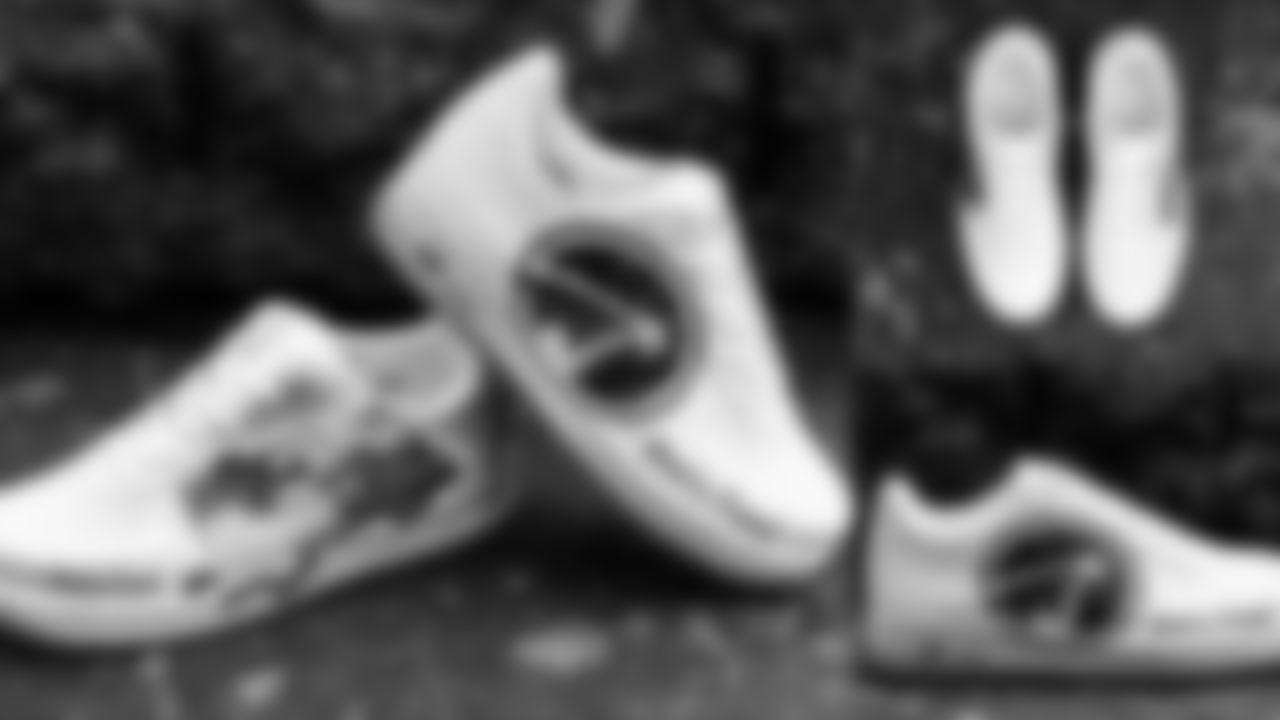
Seahawks General Manager John Schneider
Cause: Ben's Fund
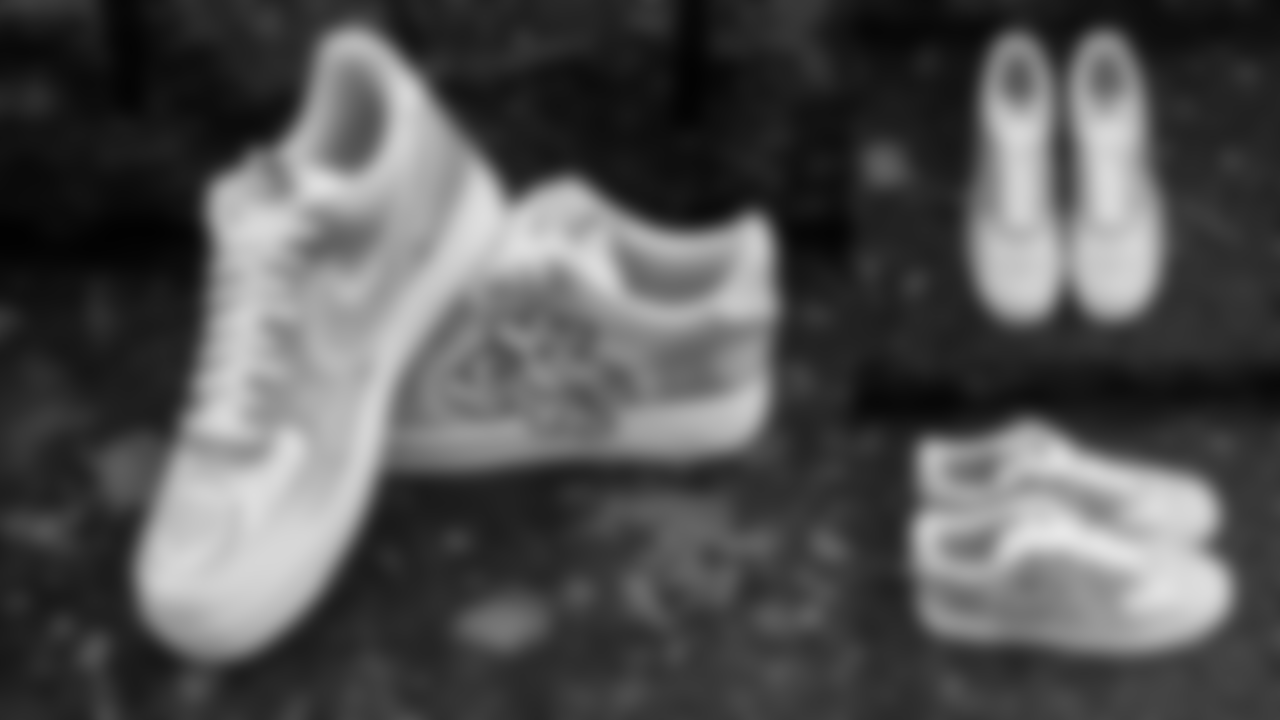
Seahawks President Chuck Arnold
Cause: One Love Foundation
Arnold: "Looking forward to showcasing 'My Cause, My Cleats' on Sunday in support of One Love Foundation, which raises awareness to end relationship abuse by educating young people about healthy and unhealthy relationships."
Artist: CusTheArtist







